#the way this– the way this mirrors Obi Wan and Luke's journey like–
Text
Obiwan Kenobi is Star Wars in its purest form.
It's sometimes clumsy, naive, going off in all directions, which makes it singular and unique... in the original trilogy way.
It's also a show that places the journey of each at the center of its narration, paying tribute to the prequels and its tragic characters.
To culminate the Star Wars tribute, in a symbolic way, each of its 6 parts mirrors each of the first 6 movies, highlighting Lucas's motto : "It's like poetry, it rhymes".
The details below are taken from Nerdist and ScreenCrush 👇
I
It introduced a child at the core of the univers : Anakin Skywalker and Princess Leia. The episode is also largely set on Tatooine.
II
“Part II”s main location is the planet Daiyu, which is portrayed as a neon-lit cityscape. The mood and atmosphere of the place strongly resembles the bustling metropolis of Attack of the Clones’ early sequences.
III
Both Revenge of the Sith and Part III climax with a lightsaber duel between Obi-Wan and Anakin/Vader. In Sith, Obi-Wan is victorious and Anakin is horrifically burned. In Obi-Wan, Vader wins and Kenobi gets burned.
IV
Both’s central story involves a rescue mission to rescue Princess Leia. One of the heroes even has to disguise themselves as a member of the Empire.
V
The Imperials attack a refugee base, with only a few escaping with high casualties. There’s even a shot of Vader as he watches a rebel ship narrowly escape, just as he watched the Falcon escape.
VI
The final duel between Ben and Vader was very much like the final battle between Luke and his father. In the film, Luke says to Vader “then my father is truly dead.” Obi-Wan tells Vader after their duel in Part VI, “then my friend is truly dead.” And last but not least, Obi-Wan saw his long-dead master Qui-Gon Jinn as a Force Ghost at the very end of the series. And that moment was just like Luke seeing the Force ghosts of his Jedi mentors and father.
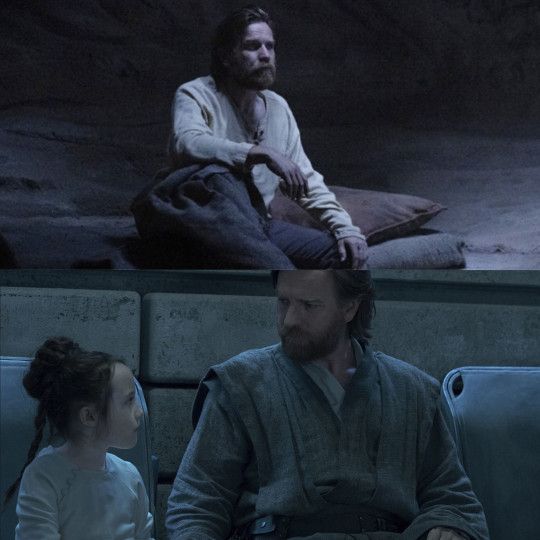
#hayden christensen#star wars#ewan mcgregor#obi wan kenobi#obi wan star wars#anakin skywalker#obikin#hayden and ewan#natalie portman#padme amidala
56 notes
·
View notes
Text
if i think about this too much i am going to start twitching and possibly sobbing But the combo of like cody and the cody and obi-wan moments from this interview being in the kenobi show ,,,,,, like the show has to have more episodes to actually let cody have space in the narrative. cody is there in the beginning. they are bickering and suffering and trying to help each other as best they can. they watch over luke. obi-wan is sad over anakin and the jedi and cody is sad over rex and his brothers. they are trying to make amends to each other for their past (o66, the whole chip debacle in general, feeling like they failed each other and their men). the focus overall is on obi-wan's introspection and struggle since he is the title character, but it is mirrored and elevated by what cody is going through and how they feel about each other as survivors of double genocides.
bail still needs obi-wan to go after leia, and this time luke is watched over by cody. (owen also likes cody better than obi-wan but that's beyond the point rn) and as obi-wan does all his nonsense out there saving leia etc, occasionally we purposefully cut back to cody on tatooine in ways that continue to mirror obi-wan's journey. maybe he even speaks with luke, and it reminds him of rex. cody worries over obi-wan and obi-wan worries over cody, even as they once again have a higher priority to contend with over their relationship.
eventually, obi-wan does confront anakin and accept him as vader. reva still has the same backstory, and comes to tatooine and owen and beru are there to protect luke with cody, and that all still goes the same way except you can add cody who is also contending with the purge as someone who can understand reva in some way. he is haunted by his actions and his loss, he gets losing your family and he gets wanting to be better too, and he, the former soldier, can help her even a little without any weapons. her arc is not resolved by him or by obi-wan, but it is an example of how they both have changed in what they say to her in the end, the forgiveness they extend to her being more like forgiveness for at least some of their own pasts
im not really sure how to wrap things up for cody, im going off the cuff here, but the rebellion is growing and needs capable minds like cody. maybe his departure is centered around rex or reva. he's also getting older and it's a dangerous galaxy so at some point he could actually die (do i want this? no im just saying) and that potentially could be a resolution worthy of cody if done right. they also could just leave it open ended, and cody stays with obi-wan in the end, at least for a while, and they don't tell us where he goes before anh, hinting at further tragedy and loss for them both, but allowing them a period of time before then. the softest life currently available.
#i dont even know if this makes sense#this isnt even all my thoughts lol#star wars#commander cody#obi wan kenobi#codywan#cj.txt
30 notes
·
View notes
Note
Here is a thing that I love about RotJ that I think some people who maybe didn't imprint on the OT miss. Anakin's redemption is a satisfying ending to his arc, sure, but it's specifically the happy ending to *Luke's* arc. Luke has had 3 movies worth of life trying to beat the idealism out of him to make him into the Jedi Warrior who will kill Darth Vader. But Luke ends up being right. There is hope for everyone, even Darth Vader. You can turn people back. You can *save* people. No one is hopeless as long as there's still some good left in them. That's Star Wars.
YES YES GOD THIS EXACTLY???
The whole thing is set up where you think (with apologies for the HP analogy, but still) it's going to be a Harry-and-Voldemort situation where the boy hero is the only one who's able to kill the dark lord. And yes, obviously, in HP the love of friends and family plays a part in crushing the wizard fascists, which is as it should be. (Truly, how JKR turned into an intolerant radicalized bigot after teaching an ENTIRE generation of children exactly how fascism works and is responded to, or rather not responded to, by the government, the education system, and the so-called "respectable institutions" of society is one of the great mysteries of our time, but never mind that.) And obviously, yes, HP came after Star Wars and was influenced by it. But even in SW's own time, especially in Reagan-era America that was churning out triumphalist action movies about crushing the Evil Empire (aka the USSR) by the bushel, you would think that was what they were going for. (And yes, Reagan famously did use that exact metaphor and talk about "Star Wars"-esque defense systems, so it was absolutely part of the pop-cultural and political zeitgeist).
Instead, you get a story where Luke -- likewise the deconstructed Macho Action Hero who resists every chance to be toxically masculine, brutish, dark, and violent, in direct contrast to his villain father -- actively and radically chooses compassion as the way to save the day. He doesn't try to defeat it by becoming just as bad as it and excusing himself that way, or entering into the same destructive, violent, hateful spiral. In it, he breaks the cycle of abuse both for his ancestors and for himself, and gives Vader/Anakin just enough of the goodness that he used to have, to make a final choice and throw a fascist down a reactor core. And by so doing, of course, saving the galaxy.
Luke validates not only his mother's dying words (insisting to Obi-Wan that there is still good in Anakin), but Qui-Gon, who believed steadfastly that Anakin was the Chosen One; his mentor Obi-Wan, who loved Anakin more than anything else in the galaxy and wanted Luke to save him but not at the cost of becoming him, and the entire belief that there is a better way to do things and that people are still people and never entirely irredeemable or undeserving of being viewed as a human in pain. That's also why the sequel trilogy is such bs, as I have repeatedly said. Sure, Luke Skywalker, who literally saved the galaxy and his supervillain father with the power of love, would just give up, abandon his family and his duty and the new Jedi order, to go live on Space Skellig Michael and be cynical and alone, since happy endings are fake etc etc. (One day, perhaps, I will not be violently embittered about the sequel trilogy, but today is not that day.)
Anyway just... yes. This. Luke is proven right to believe that there was a better way and that the solution wasn't just continuing the cycle of violence, murder, and mayhem. That it was the right way, and it works. And I don't want to hear anything about whether it was "realistic." It's a fictional story deeply patterned by the Hero's Journey and other models of mythic literature, and like the best of those, it is meant to hold up a mirror to us and ask deep questions about life, the universe, and everything, and that is exactly what it does.
37 notes
·
View notes
Text
not me reading tbobf episode 5 transcript for meta accuracy and getting hit out of the left field by the symbolism of how Armourer sends Din Djarin on a rabbit hunt to redefine his history like
"one may only be redeemed in the living waters beneath the mines of mandalore" she tells him, when Din asks about the way "to atone for breaking The Creed". There's so much going on here. She tells hims to look to history while simultaneously reminding him that "these waters are living", they flow and grow and transform and are adaptable and recieving like all living things are. She also reminds him where he can find the waters: beneath centuries of knowledge, hard earned resourses and hard earned reason, beneath the work and the physical act of what it means to be a mandalorian. Din mentions that "the mines are destroyed", and they are, for him mainly. On an individual level Din has failed to follow through with the established physicality of what being a mandalorian is about, he has broken the paradigm of a ritual that enforced mandalorian values. On a collective scale, there are barely any people and things left to define mandalorian values and what they might look like when implemented in behavior anyway.
Basically, this is the moment Din Djarin tells the armourer that he has no preceded guidance to build upon a future for himself and the ones he loves. Armourer tells him that beyond acts and armour there are ideas, and ideas are living, breathing beings, untamed and true: he can take them and build what he will with them and no matter what it looks like, it will be as right and true.
#LADS I'M HAVING. MANY THOUGHTS#the way this– the way this mirrors Obi Wan and Luke's journey like–#obviously this is the superior narrative like obi wan did luke so dirty because obi wan is a product of trauma#just like the rest of his contemporary jedi but anyway#Armourer: Din go write your homework the right way#Din: but i dont know what the right way is#Armourer: exactly#okay the first time i went through the episode i found armourer really mean for banishing him so easily but now?? girl you have my respect#Din WILL be forgiven at all costs he was never guilty for anything#but armourer needs him to redefine the rules and rewrite what the future might look like and so she needs him#to really go the extra mile and own his own judgement#this is a armourer stan account i'd commit atrocities for armourer any day#din djarin#the book of boba fett#tbobf#the mandalorian#armourer#the book of boba fett episode 5#star wars meta#sw meta
20 notes
·
View notes
Photo
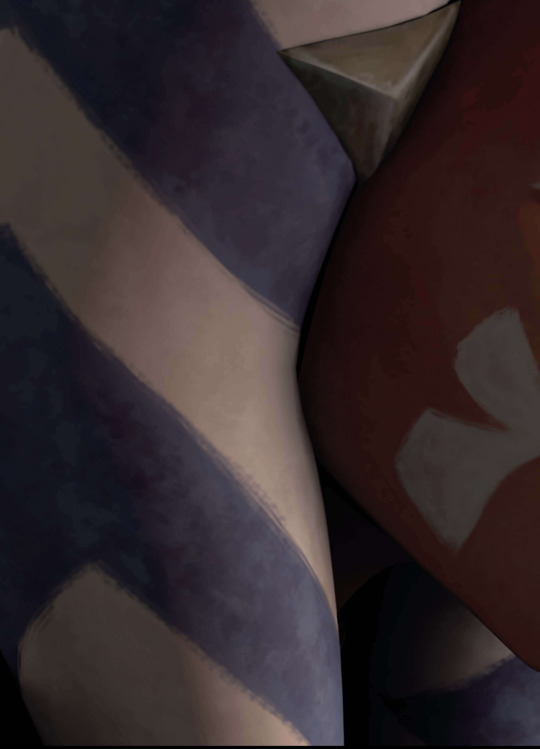

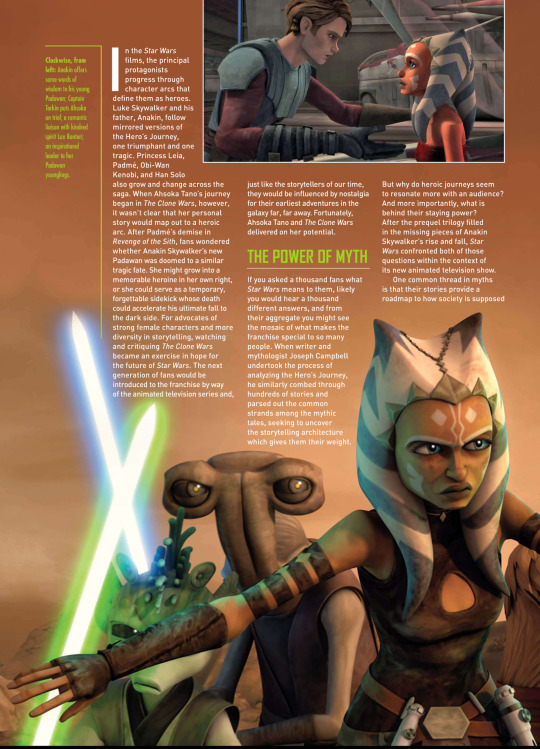
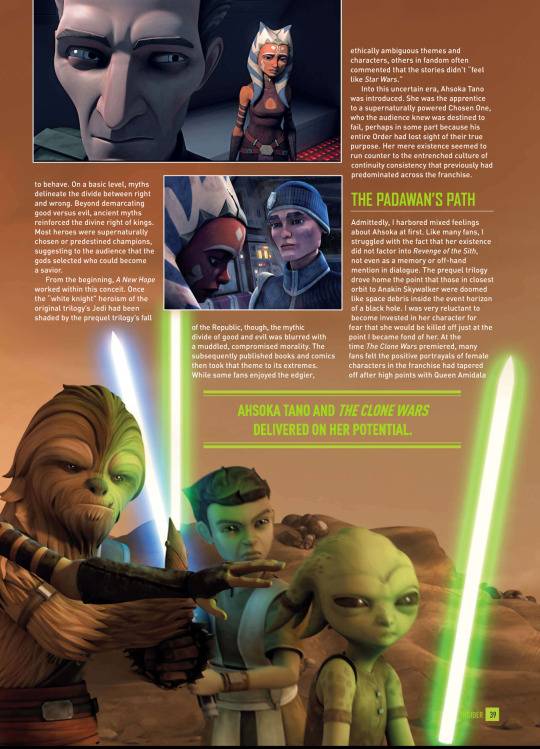
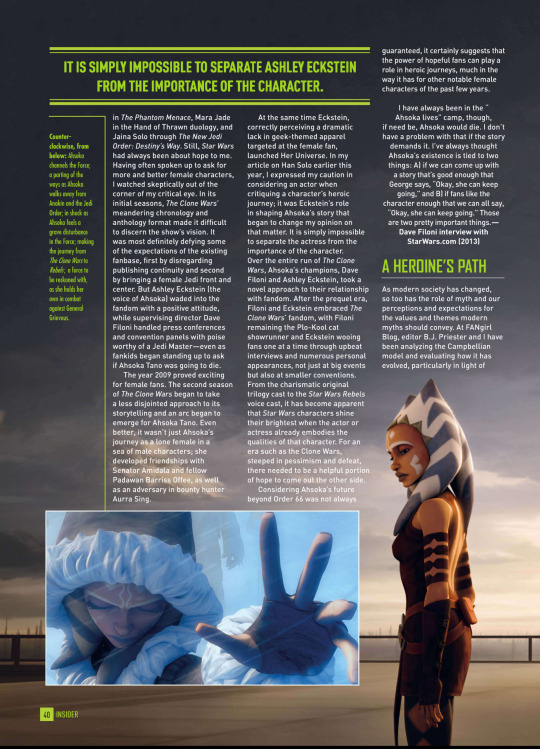
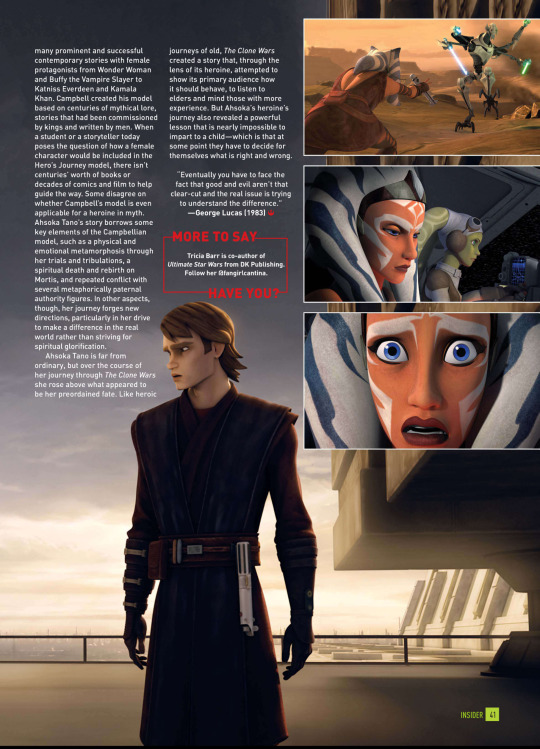
AHSOKA TANO A HERO FOR OUR TIME (#160, OCT 2015)
In her ongoing series on the Hero’s Journey in Star Wars, Tricia Barr examines how Ahsoka Tano’s arc in Star Wars: The Clone Wars reveals the evolution of mythological heroes.
In the Star Wars films, the principal protagonists progress through character arcs that define them as heroes. Luke Skywalker and his father, Anakin, follow mirrored versions of the Hero’s Journey, one triumphant and one tragic. Princess Leia, Padme, Obi-Wan Kenobi, and Han Solo also grow and change across the saga. When Ahsoka Tano’s journey began in The Clone Wars, however, it wasn’t clear that her personal story would map out to a heroic arc. After Padme’s demise in Revenge of the Sith, fans wondered whether Anakin Skywalker’s new Padawan was doomed to a similar tragic fate. She might grow into a memorable heroine in her own right, or she could serve as a temporary, forgettable sidekick whose death could accelerate his ultimate fall to the dark side. For advocates of strong female characters and more diversity in storytelling, watching and critiquing The Clone Wars became an exercise in hope for the future of Star Wars. The next generation of fans would be introduced to the franchise by way of the animated television series and, just like the storytellers of our time, they would be influenced by nostalgia for their earliest adventures in the galaxy far, far away. Fortunately, Ahsoka Tano and The Clone Wars delivered on her potential.
THE POWER OF MYTH
If you asked a thousand fans what Star Wars means to them, likely you would hear a thousand different answers, and from their aggregate you might see the mosaic of what makes the franchise special to so many people. When writer and mythologist Joseph Campbell undertook the process of analyzing the Hero’s Journey, he similarly combed through hundreds of stories and parsed out the common strands among the mythic tales, seeking to uncover the storytelling architecture which gives them their weight. But why do heroic journeys seem to resonate more with an audience? And more importantly, what is behind their staying power? After the prequel trilogy filled in the missing pieces of Anakin Skywalker’s rise and fall, Star Wars confronted both of those questions within the context of its new animated television show.
One common thread in myths is that their stories provide a roadmap to how society is supposed to behave. On a basic level, myths delineate the divide between right and wrong. Beyond demarcating good versus evil, ancient myths reinforced the divine right of kings. Most heroes were supernaturally chosen or predestined champions, suggesting to the audience that the gods selected who could become a savior.
From the beginning, A New Hope worked within this concept. Once the “white knight” heroism of the original trilogy’s Jedi had been shaded by the prequel trilogy’s fall of the Republic, though, the mythic divide of good and evil was blurred with a muddled, compromised morality. The subsequently published books and comics then took that theme to its extremes. While some fans enjoyed the edgier, ethically ambiguous themes and characters, others in fandom often commented that the stories didn’t “feel like Star Wars.”
Into this uncertain era, Ahsoka Tano was introduced. She was the apprentice to a supernaturally powered Chosen One, who the audience knew was destined to fail, perhaps in some part because his entire Order had lost sight of their true purpose. Her mere existence seemed to run counter to the entrenched culture of continuity consistency that previously had predominated across the franchise.
THE PADAWAN’S PATH
Admittedly, I harbored mixed feelings about Ahsoka at first. Like many fans, I struggled with the fact that her existence did not factor into Revenge of the Sith, not even as a memory or off-hand mention in dialogue. The prequel trilogy drove home the point that those in closest orbit to Anakin Skywalker were doomed like space debris inside the event horizon of a black hole. I was very reluctant to become invested in her character for fear that she would be killed off just at the point I became fond of her. At the time The Clone Wars premiered, many fans felt the positive portrayals of female characters in the franchise had tapered off after high points with Queen Amidala in The Phantom Menace, Mara Jade in the Hand of Thrawn duology, and Jaina Solo through The New Jedi Order: Destiny’s Way. Still, Star Wars had always been about hope to me. Having often spoken up to ask for more and better female characters, I watched skeptically out of the corner of my critical eye. In its initial seasons, The Clone Wars’ meandering chronology and anthology format made it difficult to discern the show’s vision. It was most definitely defying some of the expectations of the existing fanbase, first by disregarding publishing continuity and second by bringing a female Jedi front and center. But Ashley Eckstein (the voice of Ahsoka) waded into the fandom with a positive attitude, while supervising director Dave Filoni handled press conferences and convention panels with poise worthy of a Jedi Master—even as fankids began standing up to ask if Ahsoka Tano was going to die.
The year 2009 proved exciting for female fans. The second season of The Clone Wars began to take a less disjointed approach to its storytelling and an arc began to emerge for Ahsoka Tano. Even better, it wasn’t just Ahsoka’s journey as a lone female in a sea of male characters; she developed friendships with Senator Amidala and fellow Padawan Barriss Offee, as well as an adversary in bounty hunter Aurra Sing.
At the same time Eckstein, correctly perceiving a dramatic lack in geek-themed apparel targeted at the female fan, launched Her Universe. In my article on Han Solo earlier this year, I expressed my caution in considering an actor when critiquing a character’s heroic journey; it was Eckstein’s role in shaping Ahsoka’s story that began to change my opinion on that matter. It is simply impossible to separate the actress from the importance of the character. Over the entire run of The Clone Wars, Ahsoka’s champions, Dave Filoni and Ashley Eckstein, took a novel approach to their relationship with fandom. After the prequel era, Filoni and Eckstein embraced The Clone Wars’ fandom, with Filoni remaining the Plo-Kool cat showrunner and Eckstein wooing fans one at a time through upbeat interviews and numerous personal appearances, not just at big events but also at smaller conventions. From the charismatic original trilogy cast to the Star Wars Rebels voice cast, it has become apparent that Star Wars characters shine their brightest when the actor or actress already embodies the qualities of that character. For an era such as the Clone Wars, steeped in pessimism and defeat, there needed to be a helpful portion of hope to come out the other side.
Considering Ahsoka’s future beyond Order 66 was not always guaranteed, it certainly suggests that the power of hopeful fans can play a role in heroic journeys, much in the way it has for other notable female characters of the past few years.
I have always been in the “Ahsoka lives” camp, though, if need be, Ahsoka would die. I don’t have a problem with that if the story demands it. I’ve always thought Ahsoka’s existence is tied to two things: A) if we can come up with a story that’s good enough that George says, “Okay, she can keep going,” and B) if fans like the character enough that we can all say, “Okay, she can keep going.” Those are two pretty important things.
—Dave Filoni interview with StarWars.com (2013)
A HEROINE’S PATH
As modern society has changed, so too has the role of myth and our perceptions and expectations for the values and themes modern myths should convey. At FANgirl Blog, editor B.J. Priester and I have been analyzing the Campbellian model and evaluating how it has evolved, particularly in light of many prominent and successful contemporary stories with female protagonists from Wonder Woman and Buffy the Vampire Slayer to Katniss Everdeen and Kamala Khan. Campbell created his model based on centuries of mythical lore, stories that had been commissioned by kings and written by men. When a student or a storyteller today poses the question of how a female character would be included in the Hero’s Journey model, there isn’t centuries’ worth of books or decades of comics and film to help guide the way. Some disagree on whether Campbell’s model is even applicable for a heroine in myth. Ahsoka Tano’s story borrows some key elements of the Campbellian model, such as a physical and emotional metamorphosis through her trials and tribulations, a spiritual death and rebirth on Mortis, and repeated conflict with several metaphorically paternal authority figures. In other aspects, though, her journey forges new directions, particularly in her drive to make a difference in the real world rather than striving for spiritual glorification.
Ahsoka Tano is far from ordinary, but over the course of her journey through The Clone Wars she rose above what appeared to be her preordained fate. Like heroic journeys of old, The Clone Wars created a story that, through the lens of its heroine, attempted to show its primary audience how it should behave, to listen to elders and mind those with more experience. But Ahsoka’s heroine’s journey also revealed a powerful lesson that is nearly impossible to impart to a child—which is that at some point they have to decide for themselves what is right and wrong.
“Eventually you have to face the fact that good and evil aren’t that clear-cut and the real issue is trying to understand the difference.”
—George Lucas (1983)
124 notes
·
View notes
Text
I’ve been thinking about this for a while.
And it hurts.
So, Anakin Skywalker. There’s one thing in my mind that’s always associated with him, and it’s not what you’d think. Not the fact that he’s a Jedi or the chosen one, not even specifically Darth Vader and his betrayal. No, whenever I think of him, I think of Slavery.
Think about it. He may not have been called a slave (by that term) for most of his life, but there was never a point in his life where he was without a Master.
In the first movie, he was very explicitly a slave.

In the second, he wasn’t.
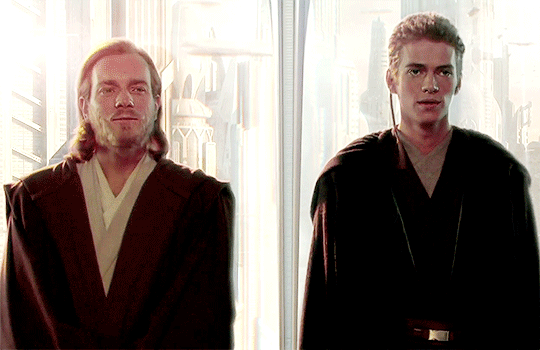
But he still had little say in anything in his life, as he was tethered to Obi-Wan. I must say, as much crap as he gets from the fandom for being a whiny teenager? I get why. I really get it. He’s so kriffing bitter. He left home thinking that he would finally be free, and be given the chance to become a Jedi knight and help people (remember the dream that he had that he came back to Tatooine and freed all the slaves?) And it turns out being a Jedi is not like he thought. He’s not helping those that truly need it like he did when he volunteered to help Qui-Gon and Padmé on Tatooine. He’s helping negotiate deals between politicians (remember all the conversations about aggressive negotiations, with him and his Master Obi-Wan “The Negotiator” Kenobi?)
In the Clone Wars series, we see Anakin temporarily re-enslaved by the Zygerrian queen (and may I just add, the older I get, re-watches of this arc become more and more disturbing), and this arc actually explores the idea that Anakin has never stopped being a slave, that the Jedi are just as much slaves to the republic as he was a slave on Tatooine.

And then we get to Revenge of the Sith. In which Anakin is denied the rank of Master.
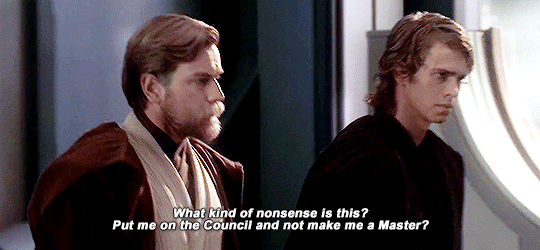
But I think this means a lot more to him than we realize. It wasn’t just a promotion to Anakin. It was him finally escaping servitude once and for all. It was him achieving peer-ship with the people who (in his mind) had controlled his life up to this point. The word “Master” means something different to Anakin than it does to the rest of the council and the Order at large. And so they didn’t understand. I think that denying Anakin the rank of Master was a bigger turning point than a lot of people realize. Because I imagine he would feel in that moment like he would always be that little slave boy from Tatooine, and that the Jedi were keeping him that way. That wasn’t their intention. They didn’t know he was feeling this way, and I doubt they would have understood even if they did. This was a major factor in Anakin’s turn to the dark side.
But even after his turn, he wasn’t free.

He was more slave than ever, tethered to his new Master, Sidious. He has no say over what he does or where he goes. He does only what his Master says. He is confined in this suit that restricts his ability to move, to walk, to fight, to see; that made it so much easier for his master to control him. His personal mobile prison. A set of mechanical chains.
As terrifying as Vader was to outsiders, as incredible as Anakin was during the Clone Wars, he never stopped being the little slave boy from Tatooine.

Until his Son came and freed him.
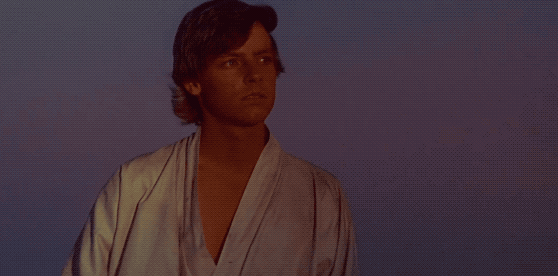
And in this context, Anakin and Padmé’s relationship takes on a brand new meaning. I think the only times he felt truly free was when he was with her. When he first saw her on Tatooine, he called her an Angel, a creature he had heard about from the pilots, who were not slaves, who were not confined to the desert of Tatooine, and who he wanted to be like someday (and isn’t it ironic that these Moons of Iego, this place that Anakin associated with freedom, was found isolated and enslaved during the clone wars, during a time when Padme herself was sick and dying).

Their relationship was something the Jedi had no say in, no control over. And I think that’s a big reason why he is so protective of her, to the point of being controlling at times. How ironic, that in his zealous quest to safeguard his own freedom he began to infringe on the freedom of so many others.
But Luke, the product of his and Padme’s relationship, was different. In many ways, Luke’s life mirror’s Anakin’s. He grew up on Tatooine, he became a Jedi, he got caught up in the middle of a galactic war. But the difference is, Luke wasn’t a slave. Not at any point in his journey. When he left Tatooine, he made the choice to do so. When he became a Jedi, that was his choice. When he left to save his friends, he was willing to give up his training to do it. Luke walked Anakin’s path, but he did so freely. And in the end, it was Luke that quite literally removed Anakin’s chains.

#darth vader#anakin skywalker#the phantom menace#tpm#attack of the clones#aotc#revenge of the sith#rots#star wars#clone wars#padme amidala#luke skywalker#darth sidious
1K notes
·
View notes
Text
for forever — obi-wan kenobi
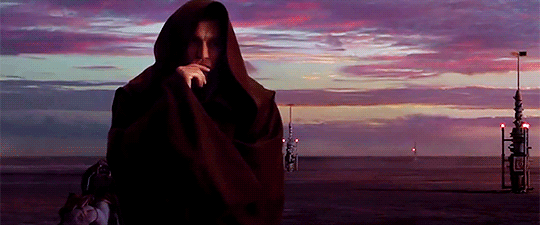
pairing(s) : obi-wan kenobi x reader ( mostly focused on obi-wan’s character, not the relationship because i am a hoe for this man )
summary : after the fall of the jedi order, you can finally be together. alternatively, obi-wan needs therapy/deserves happiness.
word count : 2.1k
warning(s) : character death, a bit of angst i guess but it’s mostly fluff.
notes : roughly edited so i apologize if things don’t make sense, i honestly came up with this on a whim and have No Idea what was going through my head when i wrote this. the povs also switch a lot but enjoy </3.

The sand bit at his fair skin, the grainy winds of Tatooine ruffled through his auburn locks, peppered with strands of grey, as Obi-Wan Kenobi stood, rigid and grief stricken. Kind wrinkles framed his eyes, eyes weighed down by exhaustion and desolation, the memory of a thousand wars flickering in the brilliant blue reflection. Without speaking, the woman looking at him from afar knew he had suffered a lifetime of hardship and grief, his aching heart not given a moment to mourn the loss of those closest to him. The mahogany cloak billowed around his body, covering the burnt, tattered tan robes he wore, as the wind picked up, signaling there would be little time before the twin suns set and it was much too dangerous to be outside. Snuggled between the lone man’s arms, swathed in soft cream blankets to shelter him from the cruel and unforgiving weather, was a baby. With sea blue eyes and the sparse tufts of pale blonde hair, the newborn was the mirror image of his father — that in itself was bittersweet.
Fire. That was all Obi-Wan could remember, the smoldering lava confining him and his enemy — once his friend, his brother — inside a tight circle of flashing blue and blazing rage. Now, things were blissfully quiet, as if the universe was trying to give him peace of mind after what it had taken from him. With heavy shoulders and hollow eyes, Obi-Wan was a shell of who he used to be: a great warrior and an excellent negotiator, all gone. His last mission was here, on Tatooine, to deliver the baby to his aunt and uncle: Owen and Beru Lars. Then, he would spend the rest of his years wasting away in a sandy prison, languishing in his defeat.
“Is it true?” The woman from afar, who had taken to staring at him from a distance, finally approached him, awaiting his answer with bated breath — Beru. Is it true? The words reverberated in his head, as the reality came crashing down upon him. The woman in front of him needed certainty, she needed answers, answers Obi-Wan could not give her.
“Yes,” came the final reply. Who knew a single word could hold such heavy meaning? Yes. An entire government who’s history spanned hundreds of years prior collapsed within a single day? Yes, that had happened. His religion, who he had devoted his entire life to and poured his soul into, gone? Yes, decimated without a sliver of mercy. The baby’s father, the hero of the galaxy, the crown jewel of the Jedi Order, killed? Yes, murdered in cold blood.
Beru finally brought her attention to the boy nestled within the robes of the man. “Is he . . . ” She seemed to only speak in half questions, as if finishing the sentence would make it a harsh reality, and leaving the query to hang heavy in the air would somehow leave her life in a fairytale.
“Yes,” he replied again, nearly choking on his words as the boy let out a tiny coo, as if he sensed they were discussing him.
“Oh.” There was a pause, a flicker of hesitation, before the woman decided to continue her pattern of half inquiries to form her own story. “May I?” With shaking arms, Beruu reached forward to take the boy from Obi-Wan’s grasp and welcome the baby into her own warm embrace. Part of him didn’t want to let the child go, for once he did he would have no real connection to his past life. Letting go of the boy meant letting go of everything, from his first steps in the Temple, to his meeting with his apprentice on Naboo, to the countless, sleepless nights in a war torn galaxy, it would all be gone. The woman’s tender smile and patient gaze was nearly patronizing, she was trying to sympathize with something she couldn’t possibly understand. No one could. A wave of fury washed over him, trapping him in a cage of his own emotions. Obi-Wan had never felt such an intensity roll over his body, preferring to keep his temperament a tranquil, emotionless pit. But this raw, uncontrollable fury was soon washed out with an even more overpowering bout of sorrow, shaking him with such force it made his knees wobble and threaten to give way. For over thirty years he was taught emotions were the enemy, by being detached and aloof he would survive, and look where that had gotten him.
Another soft cry from the baby jerked Obi-Wan back into the present moment, as his tiny arms reached for the woman, drawn to her sunny kindness and comforting aura; he realized a place to call home or a comforting shoulder to cry on was never something he could offer as the baby grew older. The woman made a small clicking sound with her tongue, looking up at Obi-Wan with an expectant gaze, and yet his grip on the baby remained the same. Although his mind seemed desperate to listen to logic, to reason, his body remained motionless, following the dull ache and painful longing in his heart. The battle between his mind and emotions lasted a fraction of a second, and at last, as it had time and time again, his mind won.
Like he had done all his life, selflessly sacrificing himself for thee good of the galaxy, he let go.
The woman took the baby in her arms, and began her journey back to her homestead, pausing just slightly to exchange one last parting smile and a word of comfort. “I think someone wants to see you, Master Kenobi.” With that, Beru began walking, a happy baby in her arms, to her husband, just as the sky merged from clear blue to salmon pink and hazy orange, the twin suns beginning to disappear over the horizon rapidly. As the light dimmed and dusk settled in, the man could make out the shadowy figures of Beru and Owen Lars, holding Luke Skywalker in unmoving content.
Here to see me? Obi-Wan frowned, reflecting on the woman’s words. This was not his home, his very identity was supposed to remain a secret, who could possibly want to see him? Unless . . .
No, that was impossible. He had mourned your death just as he had mourned every other Jedi’s death the moment their own clones turned against them, and he would not allow even a tiny sliver of hope to crawl its way back into his heart. Because in the end, he could only cling to the belief that things would get better, and false hope in such a desperate time would be his undoing.
—
You wondered how long you could stand in the shadows before he noticed you, standing awkwardly by his dewback as he delivered Padmé and Anakin's son to his new family. Like Obi-Wan, you had suffered the loss of everything and everyone you knew, your entire life destroyed in the span of a second, and all you could do was stand there, watching everything burn. The Jedi robes you once wore with pride, robes that were once a symbol of humility and hope across the galaxy, now put a priceless bounty on the head of anyone who wore them.
“Obi-Wan?” The name was dry in your throat, mouth parched and lips cracked due to the harsh Tatooine heat.
Though he was always subtle, you could see his entire demeanor change, the way his shoulders became straighter, the way his hands, once balled up into fists of worry, were now relaxed and laying loosely at his side. In a moment, he had turned around and closed the distance between the two of you, caramel boots growing dull and scuffed as he stepped through the unforgiving desert surface beneath him. “You’re alive,” his voice came out in a hushed, cautious tone, disbelief still tainting the edges. “I thought — Yoda and I — the only ones left — ” his words grew more jumbled with each passing phrase that left his lips.
“But I’m here. I’m here, and I’m not going anywhere,” you cut him off, the calm gentleness of your tone making him stop in his tracks. Slowly, each movement pained and deliberate, you stepped closer, inching your way forward until he was right in front of you. Neither of you could look away; with the Jedi Order dead, there was no reason to hide in secrecy now.
—
To realize he was not alone was comforting, but to know it was you he could seek company in was freeing. In that moment, with the distance so close between your bodies, Obi-Wan dared not breathe, his eyes fluttering shut as he let out the smallest of breaths — this was all he had ever wanted, and still, despite everything, it was something he believed he could never have.
He wouldn’t allow himself to believe it. Not after he spent all those years repressing the desire that burned so deeply within him it began to rot within his heart, trapped with no release in sight. At one point, he had every reason to deny the yearning stirring within him, but now? Now there was no war, no Council, no code, no nothing to stop himself from unleashing decades of pent up turmoil within him.
And stars, it was suffocating.
He couldn’t do this.
“You know you don’t have to push me away any more.” A suggestion more than a factual statement; voice thick and barely audible.
Was this a dream, a fantasy meant to be chased after in his sleep? Or some sick, twisted premonition the Force was trying to convey to him? So many nights he had spent languishing in his loneliness, dazed in a delusion that remained but a figment of his imagination.
“I know.”
“What?”
“The Jedi are no more. We . . . We don’t have to pretend we don’t have — ” The words were bittersweet on his tongue; even with no one there to watch and scold him, he could not betray his way of life so easily. That everyone I have ever loved, I have watched die in my arms? And throughout all of that, I have never been tempted by the dark side, but if I lost you, I would be afraid of my own morality? Those were not easy thoughts to formulate into a coherent sentence — there were no words Obi-Wan could say that would even begin to describe how he felt.
Instead, in a tender gesture of vulnerability, he reached out through the Force, and all at once it came crashing down on him.
This feeling . . . it was all consuming, and he was drowning, struggling to keep his head above water and not surrender to its frosty depths. He was submerged in an endless stretch of icy ocean water so frigid and numbing, that he felt nothing and everything all at once. It was terrifying to think — and let you know — you held so much power over him, but in the same instance, he felt at peace, like a weight he had dragged around for decades was finally lifted off his shoulders. I love you, rang as bright as the city lights on Coruscant and as clear as a Nabooian waterfall. I love you.
“I love you, too.” He heard your voice in a soft whisper, swelled up with emotion as you took in everything. Chills erupted down his spine; he couldn't quite tell if it was from the inky blanket being tugged across the sky as dusk descended into nightfall, or if it was the four word phrase that left your lips.
—
“I cannot live without you,” Obi-Wan let out a shaky exhale, breath fanning across your face just slightly, your foreheads making contact in the lightest movements. You felt dizzy, in a dreamlike trance, for you had never been this close to him. You could see every horror he had survived in his glassy blue eyes, notice every perfect imperfection that blemished his skin and made him all the more real. In a moment, his face had become blurred as he closed the distance and finally, finally, his lips were on yours, and you connected in a long awaited, eternally sought after kiss. You could feel his hands, calloused but gentle, cupping your face, as your own fingers found their way to the nape of his neck, the kiss grew more fervent and needy, every rule you had ever lived by crumbling as you melted deeper into his touch.
After a long moment, you broke away, breathless, your face still tantalizingly close to his.
“I will never leave you, Obi-Wan,” your lips parted in a determined vow, a promise you would keep to your dying breath. The Jedi were dead, and yet you never felt more alive.
#obi-wan x reader#obi wan x reader#obi-wan kenobi x reader#obi-wan kenobi x you#obi wan kenobi x reader#obi wan kenobi#star wars#angst#probably should edit this#obi-wan needs a hug#and some therapy too#post order 66#revenge of the sith#prequel trilogy#star wars prequels#one shot
86 notes
·
View notes
Text
Death in Star Wars, and How Ben Solo Was Shafted: A Mini Meta
Something has been bothering me about Ben’s death in The Rise of Skywalker. While I’m upset that he died, I echo the sentiments of other fans that just as offensive was the way that he died and how his death was treated in the context of the film. It bothered me because death has always been a part of Star Wars, but usually handled much better.
And so this meta was born.
I will be doing a brief analysis of significant character deaths from the Star Wars movies. I don’t want to touch on all of them because there are simply too many, so I’ll focus on the ones that were either major characters (i.e. trio billing or main villain) or narratively important (i.e. Shmi Skywalker).
This list will be approached chronologically within the Star Wars universe, beginning with:
Qui-Gon Jinn; portrayed by Liam Neeson
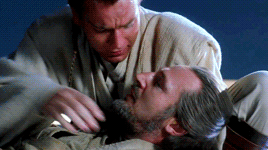
Personal feelings: I cried like a baby. Qui-gon holds a special place in my heart. His death was both epic and sombre. It hurt to watch other main cast celebrating their victory after defeating their respective challenges and then cut to Obi-wan cradling his master’s head in his lap, crying.
Mode of death: Killed by Darth Maul at the end of The Phantom Menace. His actual death takes a few minutes of screen time, an outburst/scream from another main character (Obi-wan). He has last words to say to the person he has the closest on screen relationship with.
Aftermath: Held by a visibly devastated Obi-wan while he died. Sombre funeral pyre. Death discussed on screen by the council and Obi-wan.
Narrative purpose: To enable Anakin’s training under Obi-wan, which is pivotal to the overall arc of this trilogy. To provide a tangible loss and character growth for Obi-wan, who failed to save his master from a Sith--later mirrored by Obi-wan’s inability to save Anakin from becoming a Sith in Episode III, thereby providing a narrative ‘tail-end’ to Obi-wan’s journey in the trilogy. To cement the master/apprentice relationship as loving, emotional, familial, which then adds narrative depth to the bond between Obi-wan and Anakin. To introduce a cohesive theme of death, failure, and loss at the hands of the dark side that would pervade this trilogy.
Overall response: This death is both emotional and narratively important. It’s given the weight and time it deserves to have an impact on the characters.
Shmi Skywalker; portrayed by Pernilla August

Personal feelings: Rough acting aside, watching a person die in their family member’s arms is always sad. It’s an extremely dark moment in a film that otherwise leans heavily into romance, action, and detective-mystery storytelling.
Mode of death: Tortured by Tusken Raiders. Died from her injuries. Again, her actual death takes a couple of minutes of screen time. She is able to say some last words to her son, the most important character relationship for this character.
Aftermath: Dies in the arms of her visibly devastated son. Anakin murders the Tuskens for revenge. On screen funeral where she is mourned and memorialized by her family/loved ones.
Narrative purpose: To drive Anakin further to the dark side by taking advantage of his love and compassion and turning this into anger and hate (revenge against the Tuskens). To plant the seeds of Anakin’s inability to save the ones he love. To emphasize his failure to keep his promise to return to his mother and free her. (Despite being freed off screen, she essentially died in captivity anyway, and Anakin was not the one to free her.) To further the cohesive themes of the trilogy: death, failure, loss, the power of the dark side.
Overall response: While not as moving for me personally as Qui-gon’s death, it has a very relevant thematic purpose and furthers the story. Shmi’s death is given adequate time on screen and we are able to observe the responses and aftermath of that loss.
Padme Amidala; portrayed by Natalie Portman

Personal feelings: We make jokes about how she lost the will to live, but her funeral was beautiful and Natalie’s delivery of the line “you’re going down a path I can’t follow” feels extremely important in this story.
Mode of death: Up for debate. She has lost the will to live after giving birth to Luke and Leia in the wake of Anakin’s fall to the dark side. Some have theorized that her life force was taken (or given?) to keep Anakin alive, but this is not made explicit in the movies. She dies beside Obi-wan Kenobi, and has the time to say last words--words of hope for Anakin’s eventual redemption. Her death itself takes several minutes and is followed up with screen time for a funeral where characters acknowledge her death.
Aftermath: The gorgeous and enormous funeral, mourned as a queen and a senator and a good woman. Anakin (as Darth Vader) mourns with a devastated and poorly acted “nooooo”.
Narrative purpose: To fulfill the themes of death, loss, and failure (Anakin’s failure to keep her alive) at the hands of the dark side. To provide a character loss that mimics the loss of democracy, freedom, and goodness that has fallen to Palpatine’s control. To provide a visual and narrative parallel between the death of Anakin (through the death of his love) and the birth of Darth Vader.
Overall response: While this death was definitely poorly handled it did have narrative significance and it was arguably necessitated by having to have this trilogy line up with the original trilogy. Her short funeral was one of my favorites in the series.
Obi-wan Kenobi; portrayed by Sir Alec Guinness/Ewan McGregor

Personal feelings: I feel weird having an opinion about this one because this movie was made well before I was born, and so I didn’t feel a real connection to/nostalgia from these characters the way I did with the prequels and sequels. Ewan McGregor as Obi-Wan was a huge part of my childhood, so watching A New Hope in retrospect makes this death sad for me.
Mode of death: Killed by Darth Vader/becomes one with the Force. Essentially sacrifices himself so that Luke doesn’t try to come after him.
Aftermath: Luke shouts “no!”. In a later scene, Luke further acknowledges his death--”I only wish Ben were here”. Ben is later seen as a Force ghost in Episodes V and VI, continuing to acknowledge his character’s death and ongoing influence on, importance to, and relationship with Luke.
Narrative purpose: To provide growth for Luke’s character as he grapples with losing a mentor and surrogate father figure who was also the last person (he believed) who was a link to Luke’s (supposedly) dead hero father that Luke looked up to--and setting us up for this narrative complication in VI. To demonstrate that the Jedi/good guys of the film win through self-sacrifice and not through anger, hate, or fear, which is very thematically resonant in this trilogy.
Overall response: Narratively meaningful, and the character’s death is immediately recognized. We get to see the response of the characters who he has the closest relationships with.
Yoda; portrayed by Frank Oz
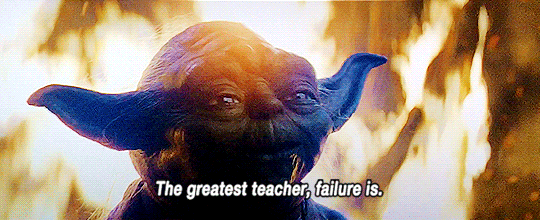
(I just love The Last Jedi, okay??)
Personal feelings: It was kind of sad, in the way any person dying of old age is. It did feel more overtly spiritual than Obi-wan’s death.
Mode of death: Dies of old age, in his own home, in his own bed, with Luke beside him. His death scene lasts a few minutes and he has some last words.
Aftermath: We see Yoda again as a force ghost, which we are expecting as an audience since his body fades like Obi-wan’s did. There is sufficient closure. Luke is present for Yoda’s death and, at this point in the films, is the only character relationship Yoda has left alive--therefore this is the most significant his death can be to someone. Luke doesn’t look overly upset but this is not painted to be a sad death, as death by old age is usually more a fact of life and a nice reprieve from untimely losses.
Narrative purpose: Honestly, it’s been a long time since I watched the original trilogy so I’m kind of stretching here. I’m going to borrow from The Last Jedi and say that Yoda’s death allows Luke to grow beyond his master and stand on his own two feet as a fully autonomous agent of goodness. He no longer has the crutch of wise older men to lean on and must make his decisions on his own. Yoda’s death frees Luke to be the master of his own destiny, now knowing the truth of his parentage and no longer being guided by others to do what they think is best (kill Vader).
Overall response: One of the less impactful deaths in the series, but I do appreciate how it adds to Luke’s growth as a character and transition into Jedi Master.
Anakin Skywalker/Darth Vader; portrayed by James Earl Jones, Hayden Christensen, and Jake Lloyd
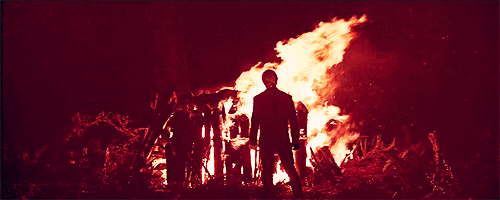
Personal feelings: This is the big one™ of the trilogy, and it shows. Watching Luke trying to literally drag his father to safety is raw and heartbreaking. Seeing him unmasked for his son is chilling. The funeral pyre is beautiful. This definitely made me feel the feelings.
Mode of death: Sacrificed himself to kill Palpatine. Death lasts several minutes. Dies in Luke’s arms and Luke cries as he dies.
Aftermath: Funeral pyre. Force ghost Anakin bringing peace to Luke and cementing his redemption.
Narrative purpose: Too much to list! Reinforcing that good guys sacrifice themselves to protect the people they love. Bringing balance to the Force by killing the Emperor (thanks JJ for messing that up by the way). Finding peace with Obi-wan as a force ghost. Showing that the belief that people can be saved from themselves is validated. I’m sure there’s plenty more besides but this one is so narratively rich that it would take forever to mine.
Overall response: Extreme narrative importance. Basically ties together six movies. Emotional, beautiful, resonant.
Han Solo; portrayed by Harrison Ford

Personal feelings: Ouch, ouch, ouch! This was... this was angsty. I love angsty. I cannot possibly find adequate words to describe how well done this scene and this death was. One of my top three moments of The Force Awakens.
Mode of death: Struck through the chest with a lightsaber by his son, Ben Solo (under the alias of Kylo Ren), after an attempt to save him from the dark side and bring him home. His body falls into the pit on Starkiller Base.
Aftermath: So. Much. Rey screams “no!” Finn is visibly upset, too. Chewie roars in agony and shoots Kylo Ren with his bowcaster. Leia can be seen feeling Han’s death and cannot find the strength to keep standing. Kylo/Ben looks immediately shaken by what he has done. Rey and Leia share a sad hug at the end of the film. In The Last Jedi, reactions continue. Luke is shaken by the revelation of Han’s death and spends a quiet moment in the Falcon mourning him. Kylo/Ben’s reaction continues to spiral. Snoke, in one of my favorite lines in the film, announces that “the deed split [his] spirit to the bone”. Rey grieves Han and accuses Ben of hating him. Luke warns Kylo that he will always be with him, “just like [his] father”. Han’s shadow is felt all over The Last Jedi without him being present. Even without the further reactions in The Rise of Skywalker (Rey saying Ben is haunted by him, the literal memory scene on the Death Star), the impacts of Han Solo’s death are the most significant in the entire franchise.
Narrative purpose: To advance both internal and external character conflicts. Kylo killing Han provides an external conflict between him and the heroes--particularly between him and Rey as Rey yearns for parents who love her and Ben (seemingly) rejects/kills his that do. It also provides a meaty internal conflict for Kylo Ren/Ben Solo, who is the most nuanced villain I have ever seen in film. While Han’s death doesn’t seem to serve a main theme in The Force Awakens (it is my perspective that JJ does not have cohesive overarching themes in his two entries in the saga), it does blend in pretty well with The Last Jedi’s preoccupation with killing the past. The thematic takeaway from The Last Jedi is that you can’t and shouldn’t kill the past, you should learn from it and move on--and Kylo killing Han neatly fits into this theme by showing that Kylo tried to kill his past by killing his father, and yet he was unable to move on because of it.
Overall response: Poignant. Purposeful. Well-crafted. The effects are long lasting and felt throughout the trilogy. This is not a meaningless death. Of the entire saga, this is the death that is given the most acknowledgement.
Supreme Leader Snoke; portrayed by Andy Serkis
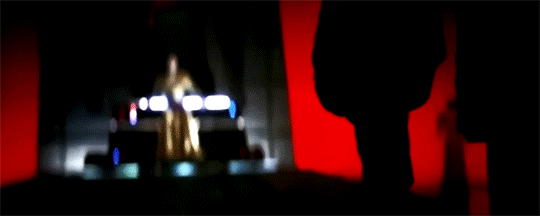
Personal feelings: I was on the edge of my fucking seat. This is not emotionally resonant because we don’t care about Snoke but it was huge and shocking and had these enormous narrative implications moving forward.
Mode of death: Cut in half by Kylo Ren while he narrates his own death.
Aftermath: The Praetorian guards spring into action to avenge their master. In a later scene, we see Snoke’s severed legs topple to the floor. Hux is visibly shaken and angry. Kylo Ren acknowledges the death (by blaming it on Rey) and takes Snoke’s position as Supreme Leader (”the Supreme Leader is dead”, “long live the Supreme Leader”). I’m... going to ignore how The Rise of Skywalker handled Snoke. It was unnecessary to have Snoke clones from a storytelling perspective. It added nothing to the narrative, just used as a clumsy way to justify that Palpatine was really pulling the strings all along.
Narrative purpose: To deepen the perceived conflict within Kylo Ren and showing his unwillingness to kill Rey. This further complicates their relationship moving forward as we’ve established that the new head honcho powerful villain has no real desire to hurt the hero. The narrative implications of this moving forward were so rich. Pity JJ ignored them. Additionally: To show Kylo Ren symbolically surpassing Darth Vader. In Episode III Anakin claims he will overthrow the Emperor and rule the galaxy with Padme. He never achieves this. But Kylo Ren does (minus the Empress by his side). To deepen the theme of Kylo Ren trying to kill/bury the past in order to become stronger (and ultimately failing). To add Snoke to the list of characters in the movie who embody the theme of failure. To shake up an expected narrative trajectory and provide new pathways for future storytelling. (Again, JJ, looking at you.)
Overall response: Loved it. Loved it. Not as resonant as some of the other deaths but by far to me the most shocking.
Luke Skywalker; portrayed by Mark Hamill
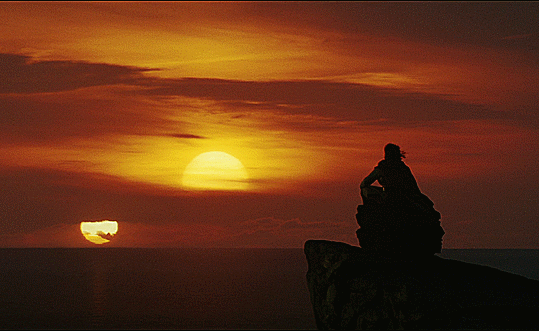
Personal feelings: Okay, this is a big one. Here’s the thing. I did not grow up with the original trilogy. I never really cared for Luke (didn’t dislike him either, just ‘meh’). But this movie. This movie. I went on a journey with Luke. I saw him as fallible. As human. Making mistakes. Failing. Falling into depression. And overcoming it. I cried when Luke Skywalker died. I did not think that would happen. I did not think I would ever love Luke so much.
Mode of death: Force projects himself across the galaxy to face his nephew and save the Resistance; the effort kills him. Luke’s death takes a couple of minutes of screentime, and it is gorgeous. Hamill acts his ass off. The music, the visuals, everything combines to make this the most emotional death in Star Wars--a fitting end for its first hero.
Aftermath: Leia and Rey feel his death in the Force. They speak to each other quietly about it. They know it was peaceful. Luke, knowing he was going to die, came and saw his sister first and gave them beautiful closure and a message of hope. Just before Luke dies, he warns Kylo/Ben that he’ll always be with him. Just like his father. Luke fades into the Force and we know we will see him again as a force ghost (which we do, but JJ managed to trash even that). The boy on Canto Bight and his friends are inspired by the legend of Jedi Master Luke Skywalker. He ignites hope throughout the galaxy once more.
Narrative purpose: Multiple. As above, inspiring hope throughout the galaxy once more. To serve the theme of self-sacrifice. Achieving victory without violence (pacifistic). Preventing Kylo Ren from killing more people he cares about (Rey, Leia, Luke) and thereby protecting him, at least a little, from himself. Also serves a similar purpose to Yoda’s death--with both Luke and Snoke dying, Rey and Kylo Ren are without masters, the arbiters of their own destiny (thanks again JJ for fucking that up too).
Overall response: I can’t decide if this or Han Solo’s death is more emotionally impactful to me. They are both so, so moving, and so essential to the narrative.
Leia Organa; portrayed by Carrie Fisher

Personal feelings: This is hard. I don’t think her scenes in The Rise of Skywalker worked. They were cut from The Force Awakens for a reason--and then cobbled together like some kind of Frankenstein’s Monster for this movie. As much as I love Leia and Carrie, I couldn’t feel emotion for her death because it was so wooden and artificial.
Mode of death: Uses the last of her energy to reach her son (it is unclear exactly how she is reaching him. Force projection? Did she create the Han memory? Who knows.) Even with so little to work with, they still managed to focus on her death with her lying down, her hand falling to the side--trying to give this some weight.
Aftermath: Chewie mourns. Ben and Rey both feel her death and are clearly devastated. The Resistance gather around her body in mourning. Her body fades at the same time as Ben’s (wtf, JJ) and then we see her as a force ghost with Luke (but not Ben because fuck him apparently).
Narrative purpose: To bring her son back to the light, something that has been a central struggle of this trilogy. Sacrificing yourself to save that which you love.
Overall response: It has a purpose, but I can’t help but think it wouldn’t have gone this way if Carrie hadn’t died. It doesn’t seem as organic as the deaths of Han and Luke.
NB: I’m skipping Palpatine because his death was literally nothing else than “defeat the big bad”. It wasn’t even fulfilling a prophecy, it had no significant narrative weight for Rey, it was a nothing burger.
Ben Solo/Kylo Ren; portrayed by Adam Driver

Personal feelings: Twofold. In the cinema, I felt nothing. Nothing. I actually laughed in surprise. Like, “what was that”? The next day, at home, I cried. I don’t think I cried because he died. I was open to that possibility. I cried because I was so, so angry at how poorly his arc and death was handled. Like he was a footnote in his own fucking story. I think him living was a much more interesting story, narratively and thematically, but I wasn’t necessarily opposed to his death if it was done well. And it wasn’t.
Mode of death: Uses the last of his life energy to resurrect Rey. Falls over. (Plop, there he goes.) Fades into the force.
Aftermath: Like, none? Rey looks kind of surprised and blinks for a couple of seconds. No words are exchanged. He just tips over and dies. Cool.
Narrative purpose (or failure thereof): I am fucking reaching here because all of the previously established trajectories and themes are dashed by this ending. We could argue that this is a self-sacrifice to save what you love theme point. Which is fine, but like, no one mourns. He doesn’t become a Force Ghost. No one acknowledges his death. Ben fading into the Force is a metaphor for him fading from people’s minds. It’s like he doesn’t even exist in the context of the story anymore. Which is insanely baffling because all three of the original trilogy heroes sacrificed their lives, at least in part, to save Ben Solo. So that he could in turn save Rey? So he’s just another cog in the machine? This was always about Rey and never about the love Han and Leia had for their son, or that Luke had for his nephew? If you think about it, the only other ‘main’ characters to die during the course of their trilogy were Qui-gon and Padme. And both of those characters had funerals, and people mourning, and huge narrative implications. The death of Ben Solo reads like the death of a minor character. It serves one very narrow and already over-represented theme. The death of all of the rest of the Skywalkers had huge emotional ramifications for the other characters in the films. With Ben Solo, the Skywalker legacy fades as well, as if JJ is telling us that this saga was not about this family at all, but their whole story existed only for the point of saving Palpatine’s granddaughter. How fucked up is that?
Overall response: Narratively, this just doesn’t make sense. It’s lazy and not impactful. When a character dies in films, you want the audience to feel something, so you show other characters reacting to it. Are they sad? Then we should feel sad too! Are they elated? We should be celebrating! No one reacts to Ben’s death, so we’re not sure how we’re supposed to feel, either. The people who are devastated by this death are the ones who love the character itself and are upset that he got treated this way--the death itself was hollow and emotionless.
So, there you have it. Ben Solo was shafted. Death is extremely prevalent in these movies, and yet, being the only new Skywalker of the sequels and half the protagonist (thank you Rian), Ben Solo has arguably the least emotional or narratively impactful death in the franchise.
Rian Johnson would never do this to Ben Solo.
#ben solo#kylo ren#reylo#star wars#star wars meta#sw meta#qui-gon jinn#shmi skywalker#padme amidala#obi-wan#anakin skywalker#han solo#snoke#luke skywalker#leia organa#tros spoilers#sw negativity#wordy#meta#mine
3K notes
·
View notes
Text
So hey y’all. Remember me talking about that au yesterday where Anakin leaves the order and Obi-Wan and Anakin just drift apart. Well it’s here for the prompt: “I’m right here where you left me.” Anyways. This will be my last piece for angstpril for this year as I want some kind of break before Mace Windu appreciation to plan or stuff. So yeah. Thank you for coming on this journey, it’s been fun.
Here on ao3
Obi-Wan watched him walk away just like Anakin had once watched Ahsoka walk away and down. His heart broke just a bit then, seeing the broad, robed shoulders dip past the line of the stairs, the blonde curls disappearing as he walked down. Mace, strong and unmoving, laid a hand against his shoulder as he swallowed, a suspicious lump in his throat. He inhaled sharply, standing straight. The hand remained, a warm pillar that he could lean on should he wish. He didn’t.
The quarters were empty. Just him and the remnants of the past. He sighed, he should probably get to cleaning. Mace, he’d almost forgotten. He turned around, facing the taller man. “Mace, I should…”
“Take a break, Obi-Wan.” He said, a grim sort of smile on his face. “Force knows you deserve it.”
Obi-Wan nodded and bowed. “I will.” He promised softly, not fully trusting his voice not to break. “May the Force be with you.”
Mace bowed back, “And with you, Obi-Wan.” He turned and began walking away down the hallway, just like everyone else did. However, Mace turned around at some point, something desperate shining in his eyes and bleeding into the Force. He wanted to help. Obi-Wan just didn’t know how to accept it. “You ask if you need anything, alright? We’re all here for you.” Obi-Wan could only find it in himself to nod shakily, thanking the Force for blessing him with Mace. Mace seemed to want to say something before smiling ruefully and turning down a corner, waving behind in farewell.
He closed the door behind him, hand raising to his beard, absently stroking it. There was… too much here. A Temple room which had housed Qui-Gon and him, then Anakin and him, then Anakin, Ahsoka and him, and now finally just him. It was large, enough room to have two and a half people living comfortably. Anakin only stayed with them half the time. It felt strangely empty. Four generations of Jedi growing up here and now the only remainder of this lineage, just him, still lived there. The throw blanket, Anakin’s because he had simply been too unused to Coruscant’s climate, still laid half open from where Anakin had used it recently. His belongings, at least what little remained in the quarters after spending half his time apparently married to Senator Amidala, had been hastily packed away and taken to her apartments, Anakin’s new one. No doubt, he would have left a few things which he would either comm for or would simply be returned to him.
Obi-Wan sighed, folding the blanket and throwing it over the back of the couch. It was ridiculously soft, comfortable for curling up with. He made his way to the kitchen, opening the cooling unit and seeing it still filled with Anakin’s favourite sauce, Anakin’s special juice (probably with alcohol. Obi-Wan hated it with a passion,) Anakin’s favourite everything. He sighed and shut the door quickly. Tea, he decided, would be able to be made with little memories of Anakin. Ever the odd one out, he had not enjoyed the intricacies of tea like Yoda, Dooku, Qui-Gon, Ahsoka, and himself had. Instead he had drunk caff, violently sweetened and strong enough to rouse a slumbering Krayt dragon with solely it’s scent. Cup fresh in hand, he moved to Anakin’s rooms where he could begin cleaning the reminders of Anakin away. Begin the process of truly becoming himself once more.
He sees Anakin three weeks later. Predictably, there had been quite a few things left over. Obi-Wan, whenever he found one had placed it in a box, waiting for Anakin. “Hey Master!” Anakin greeted, dressed in fancy garments, very different from the leather tabards, perhaps not as traditional as Obi-Wan’s cream robes, but still rather traditional. They suited him. Perhaps more than Jedi robes ever did, Obi-Wan mused quietly in the pits of his mind.
“Hello Anakin. Come to retrieve your items?” He raised an eyebrow as he noticed the haircut, more like a trim. Anakin had been growing it out, ends raggedly poking out where they wished. It looked tamed, coiffed in a fashion that Obi-Wan began to recognise as Nabooan. He moved from the corner, inviting him in. He’d never done that before. Anakin entered awkwardly, quickly making a beeline from the rather full box of assorted materials. “You left behind quite a few items. Tea?” He offered, hands tucked into his robe sleeves.
“No thank you… unless it’s floral.” Obi-Wan raised his eyebrows in surprise, sending a silent question at Anakin. “Oh. Padmè, she’s got this blend in her rooms from Naboo. Really delicate and sweet.”
“Interesting.” Obi-Wan tried not to be bitter over the fact that despite over a decade of his efforts to get Anakin into some kind of tea, Senator Amidala had done it in less than a month. “I did not think you would ever willingly drink tea.” He murmured, somewhat idly bustling away to prepare his most floral, and sweet tea.
Anakin chuckled, hoisting the box in his hands. “Yeah… er, Master? I know I said yes to tea, but Padmè has this function thing she wanted me to go to soon. So…” He trailed off apologetically. Obi-Wan stopped where he was rifling through his canisters of tea, plastering an easy but false smile onto his face. Anakin could only tell the difference sometimes. Hopefully he was distracted enough not to.
“Of course. No worries. I’m sure you’re busy.” Anakin did not notice it. That stung. “I’ll just…” He bustled to the door, clicking it open. Anakin followed, box easily balanced with liberal use of the Force.
“Well…” There is a silence, pregnant and uncomfortable. Obi-Wan shifts slightly. “Are you busy too? With relief missions and stuff?” Obi-Wan wonders what he can say and what is confidential. Once, he would have shared almost everything, but Anakin isn’t a Jedi anymore, isn’t here… with him.
“A lot to do, as I thought, but it is relieving to do something that is not fighting anymore.” Obi-Wan admits easily. No specifics, just vague truths. “Being at peace, it is a good feeling.” Indeed. There is a lightness in the Force that he hasn’t felt in a while.
“Yeah. The Force is… warm. Light.” Anakin nods in agreement, items in the box clinking as they move against each other. There is another silence, deeply uncomfortable. Obi-Wan’s cheeks colour. He has been coined the Negotiator but he can not even speak with his own former Padawan now. The rift is just… wide now, in ways it was not before.
“Yes. Well… your function?”
Anakin startles, as though he’s forgotten which… is not exactly unlikely. “Oh yeah. Sorry Master, gotta go.” And, just like before, Anakin moves away, walking down the hallways for the exit. Instead of robes shoulders and unruly hair, Anakin is now all fancy fashionable clothing and perfectly done hair. Obi-Wan slumps against the doorframe, waiting until Anakin turns a corner before returning back to his quarters. It feels like a cruel mirror of the day Anakin first left, except Mace is not there and his room is even emptier, the few knick knacks of Anakin now gone. He sighs. He’s prepared water for tea, might as well use it and make himself a cup of tea.
There is a long period before he sees Anakin again, just a glimpse of him in the corner of his eyes as he steps out of the Senate and into a speeder, Senator Amidala visibly pregnant. They don’t notice him, but he supposes that it is only a short moment, hardly their fault. The speeder emits a low hum before pulling away and racing for the speeder lanes. He hopes that Anakin is driving more cautiously with Padmè because of her pregnancy.
He sees Anakin a handful of times as Padmè's pregnancy continues, standing next to Senator Amidala in holo’s, Ahsoka sometimes with him, or on the other side of a function he’s been invited, or in the Senate pod for Naboo. There is no real talk, and their meetings become few and far between. The distance, not consciously done by either of then, begins to feel insurmountable. The handful of moments grow further apart.
Obi-Wan catches him with Senator Amidala as they leave a function, no doubt returning to the newborn children they now have. The two are dressed wonderfully in a matching outfit, cool blue and green. Their hair is done up. Obi-Wan notes how sharply they contrast him and his cream robes and short hair. “Congratulations. I heard you had twins.”
“Master Kenobi, what a surprise!” Padmè says, smiling at him. “Yes. Luke and Leia. Ani named them.” She tugs Anakin’s arm a bit, adoring eyes turning in his direction, a wide smile on her face.
“Yeah, Master. They’re the cutest. You should see them!” Anakin says excitedly. “Padmè can he…?” He trails off questioningly, eyes pleading with her.
“Of course, of course.” She says. “I know how important he is to you.” Her voice is soft, only loud enough for Anakin. She looks at Anakin before turning to Obi-Wan. “Of course, only if you want to.”
“I would love to, but I… actually have something to do.” He says sadly. “I only came to offer congratulations.” He feels guilty at their twin expressions falling into a light dejection before Padmè is tugging at Anakin’s sleeve.
“Well, Ani, we just have to invite him when he’s not busy. In… two years? Three?” She jokes lightly. The three chuckle softly before there is a pause, awkward and full of the gentle rustles of fabric as they shift a bit.
“Indeed.” Obi-Wan finally responds, an easy smile lighting his face. “I’ll just call you when I have free time. I would like to see them.” He leaves soon after, the two bidding him a fond farewell. He never has time to make that call, he hardly ever has free time with all the relief missions going on. Mace says that he’s drowning in work to avoid his problems, but Obi-Wan would disagree. By the time he thinks he’s free enough to visit them, Obi-Wan spends ten minutes staring at the contact on his comm. Shame rises, it has been years since the function and it feels too late to call them to ask to see the twins. The meetings between then and now have been formal, in events where Obi-Wan wore dress robes and represented the Order officially, or they have been fleeting, glimpses across the Senate or on opposite ends of a transport.
Obi-Wan and Anakin meet in the hangar of some backwater planet by pure coincidence. It is one of the first times he’s seen Anakin without Padmè at his side. Obi-Wan is leaving his ship as he spots Anakin walking up, his back turned away. Anakin feels him in the Force and turns instinctively, eyes locking with his. They stare for a moment, just a second, before Anakin turns, not even waving or acknowledging him, and climbs up the ship. Obi-Wan finds himself watching the ship lift off and disappear into a small pinprick of light amongst millions, feeling an acute piercing sense of loss. His mind replays sparse moments of connections. He does not know exactly when, but Anakin’s been slipping away for a while. It is only now that Obi-Wan is realising it.
Obi-Wan and Anakin. Kenobi and Skywalker. The names once only ever used in tandem. Each one following the other into battle and in space, to the ends of the world. Once as close as brothers, so in tune with each other. Some starships still bear the symbol that would showcase their connection to each other. Two halves of a whole. Now… little connects them. Obi-Wan has not even seen Anakin’s children save for small snapshots of their lives from the other end of a fancy dress party, and some footage of them on a holonews report about a break in. He had not even messaged or called Anakin to ask about his health after that. Simply looking at the contact made him almost want to throw the device at the wall, but that would not help. The problem wasn't the device, it was just them and their lives falling apart from each other. No, they are not close. Not at all. Obi-Wan looks at Anakin no. the new Anakin. He’s changed a lot. The scar still cuts his face roguishly, accentuated by subtle makeup. His hair is long, braided and pinned into an elegant style on his head. His robes, a riot of colour, mostly warm orange tones. Little reminds Obi-Wan of the Jedi knight, recklessly driving forwards with his blue blade raised high, let alone the young Padawan he had once held so dearly by his side. He has let Anakin walk away and Anakin is not his Anakin anymore. The lump of emotion, a solid block laying in his throat threatens to choke him.
“Hey Master, or should I say Grandmaster Kenobi?” There is that teasing tone, strangely stiff yet still familiar. The motion is familiar, ingrained after there decade of companionship, but rusty with disuse. Yoda had stepped down, age forcing the green troll to spend it in easy meditation with younglings and Masters alike. Obi-Wan finds Yoda’s shared meditations a highlight of his week. Lately, though, he has an inkling that the little Master is falling asleep during meditation. He doesn’t have a heart to point it out, not when the wrinkled clawed hand will reach for his after and lightly squeeze, a soft smile curving the wrinkled face when Obi-Wan responds similarly. He’s also pretty sure Yoda knows he knows.
Obi-Wan quirks a smile at Anakin’s quip. The smile feels formal and stiff. When had their easy camaraderie turned to… this. “Hello Anakin, or should I say Senator Skywalker.” Anakin had become Tatooine’s first Senator, notorious for starting revolutions and rebellions on planets as well as causing problems in the Senate. There is silence, not the easy silence they had in the calm before a battle. It is uncomfortable, glances shared between them awkwardly. Obi-Wan both wishes and does not for those times before Anakin left. “Well, perhaps I should g-”
Anakin speaks in tandem, “Master I-”
“Oh… sorry, go on.” Obi-Wan gestures a bit with his hand in a waving motion.
Anakin pauses for a moment, hesitating before speaking, something flashing in his eyes and in the Force, some kind of desperation for something. Closure, perhaps. “Obi-Wan… we hardly ever talk. Like we used to, you know?” Obi-Wan nods, his hands clasped respectfully in front of him under his robe sleeves. “We almost never see each other. I never see you around anymore.” There is a hint of accusation as if it is Obi-Wan’s fault that they never see each other. Anger flares softly before it is controlled, accepted and let go. It is not his fault, nor is it Anakin’s. They have simply… drifted apart. It has happened naturally over the course of years. The bonds that had once bound them tightly together had loosened with distance before fraying completely.
Obi-Wan feels obligated to answer, though. “I’m still here. Right where you left me.” He says, softly, feeling his eyes sting. “I never left really, just tried to move on.” He tacks on after a moment. “You left. I let you go, and you bloomed far away.” His hand gestures absently at Anakin’s getup. Anakin makes an aborted move to speak, stopping as Obi-Wan lifts a palm, asking for silence. He needs to say this. “You’ve changed. It’s not bad, but you have. You’re not the Anakin Skywalker I knew, and I don’t think I’m really the Obi-Wan you knew.” The tear slips and falls, cleaving a warm trail down his face to his beard. He sniffs, wiping it away absently. “We’re not the same as we were before you left. This… rift, it is not your making or mine, it just happened over time. A product of it.”
“But I don’t want it to change!” Anakin protests loudly, voice raising. Even his voice has changed. It is no longer just an outer rim accent, but it’s also mixed with the formal tinges of Coruscanti “I wish it wouldn’t.” His voice is a bit softer, but the vindication is still evident.
“And I wish I still knew you the way I did.” Obi-Wan agrees easily. The tears fall easily, mourning the man he’d known before, lost to the sands of time. He misses his Anakin like a limb cut off, but he knows better than to think it can still come back. He will take what the Force gives him and will accept what it takes.
“You do!” Anakin said, moving forwards slightly. "You do know me." Obi-Wan steps back and blink up at the perfectly coiffed hair and colourful intricate robes. “You do.” He repeats again, softer and less certain.
“Do I?” Obi-Wan inhales sharply, his chest hitching. The tears fall quite freely now, wamr trails sinking into his beard. He doesn't sob, it is not his way, but his hcest does rise in aborted sobs. “I don’t think I do.” He looks up at Anakin. “I knew you in one chapter of your life, Anakin, but now you are not him.” His face turns to the ground, hiding the fact that he’s desperately scrubbing at his face. “I miss him.” Obi-Wan admits readily, letting out a tired breath. “I miss the Anakin I used to know, but I’ve let him go. Long ago I watched him walk away forever. I know he’s not coming back.” He finishes softly, tiredly.
“Master…” Anakin doesn’t say anything. Anakin doesn’t sob, not anymore. HIs tears are silent little streaks of water glinting in the light as they fall down his face, still smooth like it was before. They take some time to compose themselves, Anakin bringing out a tissue to dab his eyes while Obi-Wan simply uses his robe sleeve. “I don’t think you changed. Not really. Already too old and set in your ways.” Anakin smiles grimly at Obi-Wan’s wet chuckle. “I think it’s just me.” Obi-Wan’s silence is almost an answer by itself. Obi-Wan’s silent sobs start disappearing, replaced by a numb, emptiness. He finally looks up at Anakin. “I just wish things were different. If I’d visited…” He trails off.
Obi-Wan shakes his head. “I don’t think that would have changed much.” He swallows, smiling softly. It juxtaposes the tears that still run freely down his cheeks. He mourns the Anakin that was a Jedi Knight, the Padawan who had eagerly asked him for answers to his infinite questions. This Senator Skywalker is little more than a stranger. The realisation hurts. “I’m sorry. For taking your time and all that.” The smile is hesitant, soft and unsure of how it will be received by his once-brother.
“No, no. I’m sorry.” Anakin smiles, the response thawing Obi-Wan’s heart just a bit. Anakin looks down at his wrist, a hum going off. “Oh, Force, the time. I’m sorry, Obi-Wan, but I have to go.”
“No worries. Just… stay safe, Senator.” Anakin nods in acquiescence before bowing respectfully and turning around. Obi-Wan watches him go, the sun lighting his back and, for the first time since Anakin left the Jedi, Obi-Wan does not exactly feel the rift between them grow as Anakin walks away.
#star wars fanfic#fanfic#duna writes#angstpril2021#lol this is just me projecting for 3000 words.#obi wan#Obi-Wan Kenobi#anakin skywalker#hoo boi I'm sad
11 notes
·
View notes
Text
After the new spot, I am almost 100% sure Dark Rey is not just a vision.
Here's what I think:
We already know that "Rey is driving her own thing", as Daisy said in the EW article, and that "she's not doing what other people are telling her to do", so my guess is that, among other reckless things she does without informing the Resistance, she secretly goes to Ahch-To for some reason, where she meets Kylo and they have an argument and they fight (at this point I think there is still a lot of unresolved shit between them, but they love each other and they know it deep inside even if they try to hold back their feelings, and I believe this takes place in the middle of the film). Now, something happens, Rey goes too far and in a fit of rage she accidentally kills Kylo, or rather, she believes she killed him (I'll come back to him in a moment).
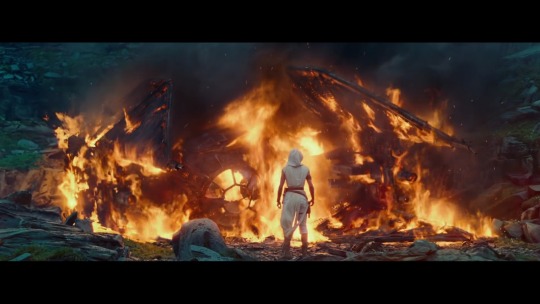
She's hurt but she cannot tell anybody 'cause no one knows about her and Kylo or the force bond, neither they know she went there. There is no way for her to explain, they wouldn't understand anyway ("People keep telling me they know me, no one does."), therefore she's completely isolated in her pain. Kylo's death is her fault and she can't bear it, she feels empty and broken and she's more alone than ever. She's lost everything.
"A bond between two living beings is not something easily broken. Is is not a choice... It is like breaking a feeling. Like turning away from the Force. To break a bond, your feelings would have to change, or one of you would have to die - but even then, the bond wouldn't go away, it would simply... It would simply be empty, a wound." (Master Zez-Kai Ell)
Fear, anger, hate, suffering: she falls to the dark side.
Notice her hollow expression in the frame below, with the hood up.

She's the perfect mirror to Anakin's fall (REVERSE ANIDALA, Y'ALL).
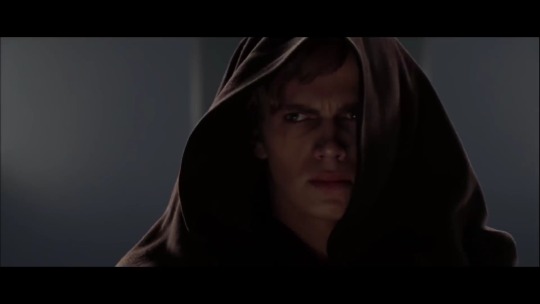
Here's when Palpatine enters the game. Either she deliberately goes to him or he calls to her, he's going to convince her to become his apprentice, manipulating her with his lies, maybe promising her that together they are going to bring Kylo back or something along these lines. Even if he doesn't promise her anything, without Ben, she has lost her hope, so she's going to follow him, regardless.
Remember Ben symbolizes hope: they named him after Obi Wan Kenobi ("you're my only hope") and in TLJ Rey explicitly states "He's our last hope". And this without counting the visual clues they gave us throughout this trilogy (i.e. him standing up when Snoke said "Hope lives in the galaxy").
We are going to see Palpatine bestowing the title of Darth-something to Rey and she's going to take the new lightsaber and clothes. She's ready. That's where the scene from the D23 Special Look comes from.
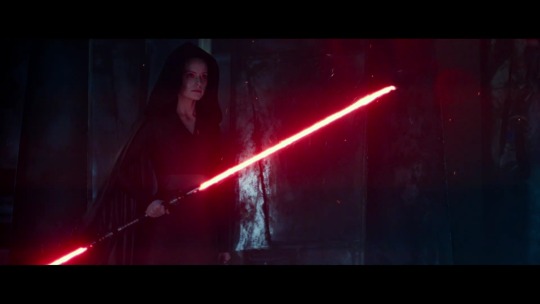
But let's go back to Kylo for a second. He obviously survived but I think he's going to disappear for a while in a place where he's going to go through a spiritual journey of self discovery and he's going to regain his true self. And maybe this place is in a sort of mystical plane created by the Force, and that's why Rey can't feel him. We're going to have some version of the Dagobah/Mirror Cave and the Force Ghosts are going to talk to him, at least Luke (but I'm sure Anakin is going to be there too).
So while Kylo comes back to the light, Rey goes to the dark side.
(this until she discovers he's alive)
What do you think? I don't see another way for Rey to turn to the dark side IF the scene is not a vision.
#tros#tros speculation#the rise of skywalker#the rise of skywalker speculation#long post#reylo#these are just my wild guesses#dark side rey#rey#kylo ren#ben solo
154 notes
·
View notes
Text
I can't really rank the SW movies, but I can sort of put them in categories. I wrote a bit about each one because I've never seen a list in an order like mine, though if you're asking me to be rational that is something I know I cannot do.
(This is really long)
1. The ones I love the most:
Attack of the Clones
🍐 favorite characters, favorite planets
🍐 my soul is anchored to early naughts high-key cheesy emo, à la Raimi Spider-Mans
🍐 most Jedi per square inch
🍐 it's pretty and it kicks ass
🍐 the romance is the A-plot for ONCE
🍐 AND it's a "dark middle chapter" that pulls no fucking punches, the whole Tatooine sequence is just hnnnnggrhhh BRUTAL
🍐 the only "dark middle chapter" in which the person explaining the Jedi way (Anakin) doesn't believe in it and the person listening (Padme) doesn't want to join but just cares about him
🍐 morally ambiguous organized religion/monasticism/chivalry are interesting and personally important subjects to me, a Catholic feminist who majored in Medieval Studies
🍐 the hinge between two time periods I love, "Obi Wan trains Anakin" and "the Clone Wars"
🍐 sets up both Clone Wars shows and both KotORs
Return of the Jedi
🐻 SO much fun, SO much imagination
🐻 like RotS, both the silliest and the most tragic in its trilogy (and imo it pulls it off)
🐻 the ending -- Luke tossing his lightsaber, Palpatine killing him, Anakin saving him -- I just -- gahhhh that's what it's all about, dude😭😭😭 It makes me love the Jedi SO MUCH!
🐻 Luke's plan to rescue Han is as bonkers as Dooku's plan to begin the war and I'm obsessed
🐻 Leia's hair down and Luke in black👌
The Last Jedi
🍸 absolute masterpiece of tragedy and hope
🍸 it's so SMART and has this wisdom that brings me so much comfort facing personal failures and societal horrors
🍸 "That's how we win -- not by fighting what we hate, but saving what we love" -- Rose the Queen of Themes
🍸 the cave scene in which Luke summarizes the prequels and Rey summarizes the original trilogy is so validating
🍸 "Where's Han?" [cut to Kylo]
🍸 all the transitions but that one ^^^^ especially
🍸 best visions in the movies (Rey's mirrors and Luke's twin suns)
🍸 Yoda is the best ghost and wisest teacher as he deserves😭
🍸 Leia Vader parallels are my biggest weakness
Revenge of the Sith
🔥 I can't handle this one
🔥 it's straight up Camelot and Lancelot is my favorite invention in all of fiction, and here he is as an evil space wizard
🔥 I literally can't listen to this soundtrack and drive because I get too sad
🔥 they hate each other SO MUCH ahhgggg, NO other characters come close to this level of emotion
🔥 the Matthew Stover novelization is even more beautiful
🔥 this meta-level tragedy, the dramatic irony of a guy who has been evil since 1977, a name similar to the Greek goddess of inevitability, the swirling destiny of his "prophecy" and his doom, but still I'm like "DON'T DO IT ANI" as if he ever had a chance
🔥 they play the fucking ANH medals theme at the end of the credits and it blows my mind. Absolutely brilliant
🔥 can you believe that only RotS and TLJ have shirtless scenes in them
2. The ones I also really love:
The Phantom Menace
😈 best soundtrack. All the prequels have the most thoughtful and interesting music in my opinion, but I could go on forever about TPM's.
😈 my favorite musical piece in all of SW is the Baby Anakin theme. It's so terribly sad; it sounds to me like rivers and waterfalls. They use it several times in AotC, too. The end of the melody transitions into the Imperial March😭
😈 Duel of the Fates is the actual star of the movie, of course; the words are a Sanskrit translation of a medieval Welsh poem. Ask me about how the lyrics apply to the fates of Qui-Gon, Maul, and Obi-Wan because I've FIGURED IT OUT
😈 also the cleverest piece in SW is Augie's Municipal Band, the parade theme, which is the Emperor's theme from RotJ in major key and sped up
😈 speaking of Palpatine, this is his best movie and I've basically sold my soul to him so👏👏👏we stan
😈 I've probably thought and written the most about this movie and the time periods around it, the training of Maul and Anakin. If you can believe it😅
Empire Strikes Back
☁️ it's the best one
☁️ the "dark middle chapter" that sets the standard for AotC and TLJ
☁️ "Luminous beings are we"😭
☁️ Bespin Leia is the best look in the movies
☁️ "The evil lord Darth Vader, OBSESSED with finding young Skywalker"😂 Ani has a reason to live again, oh no
A New Hope
🤖 the only one you need
🤖 an actual piece of magic on Earth
🤖 Old Obi-Wan is heartache personified
🤖 bow down to Tarkin
🤖 best droid movie
Solo
🎲 the other kissy movie
🎲 SO much fun; John Powell puts so much energy and excitement in his music
🎲 how does this random movie have the best character designs after AotC
🎲 GIRL DROID!!!
🎲 really different point of view on the central theme of family
🎲 that cameo tho
🎲 where's my sequel
Rogue One
🌠 the most visually beautiful SW movie; it fits into the tradition of beautiful 70s sci-fi movies like 2001 and Star Trek TMP, which focus on the hugeness and wonder of outer space
🌠 can Cassian and Rose please overthrow the government
🌠 I have a real theater poster of this one in my room :D (I also have one of TLJ)
🌠 does so right by Vader
🌠 makes the Rebellion more complicated, just like the prequels did to the Jedi Order
3. The ones I don't like:
The Force Awakens
The Rise of Skywalker
I want to like them, especially TFA, but I find it difficult. I feel like they lack confidence as stories, and they don't take things like death and faith very seriously. Many planets explode, but they are grieved even less than Alderaan is in ANH. And if you just pray hard enough, God will help you out. It bothers me that THAT was the culmination of Rey's spiritual journey, versus the more relatable and dramatic endings for the male Jedi protagonists Luke, Anakin, and Ezra.
I have rewatched TFA a few times and I like parts of it, like the scavenging setting in the beginning and how handsome everyone is. Some of Maz's lines justify the borrowed plot in an interesting way. And I've thought of some headcanons to make TRoS more okay, because they did so wrong by Palpatine but not necessarily by "the Sith" as a Borg-like force of evil that, I guess, consumed him. So despite JJ's best efforts, I'm trying to make this work.
#star wars#star wars movies#attack of the clones#the last jedi#revenge of the sith#i wrote this back in December but it's still true#leaning more toward ESB rn
5 notes
·
View notes
Text
Have You Ever Heard The Tragedy Of Darth Vader? It’s Not A Tale Your Fandom Would Tell You.
There has been some kerfuffle on the internet lately about the ending of the third Star Wars Trillogy. Specifically the conclusion of the Ben Solo/Kylo Ren Story arc. It’s got me thinking about atonement vs. redemption.
For the scope of this collection of thoughts, I’m defining atonement as “setting things right on a community level,” and redemption as “setting things right on a personal level.”
Kylo/Ben’s story arc is a redemption story, not an atonement story. And it’s a fitting echo of Darth Vader’s redemption story. In fact, The lack of atonement in Vader’s story directly contributes to Kylo/Ben’s story. And that’s what really makes the nine story arc a compelling tragedy.
Let’s set aside Ben Solo/Kylo Ren’s journey and come back to it. For the moment, let’s focus on the first six movies.
Star Wars and the Prequel Trillogy are about the fall and redemption of Anakin Skywalker, but not about his atonement.
In becoming Darth Vader, Anakin committed genocides. Plural. He started down his path to darkness by slaughtering children.
But Star Wars is not about how Anakin’s fall affected the galaxy, except when Anakin’s fall affecting the galaxy in turn affects our characters. The original trilogy/second act is told from the perspective of Anakin’s son, Luke. Through Luke’s faith, and through saving Luke Anakin is redeemed.
To reiterate, redemption isn’t atonement. Queen Isabella I of Castile was bothered by the the plight of the natives in the Carribbean enough to declare that they shouldn’t be enslaved and should be treated equally. You or I or a hundred other people shake our heads at the conditions of refugees in some part of the world we’ve never heard of. Maybe we send them our thoughts and prayers. Being remorseful doesn’t always translate into positive change.
Real atonement is about setting right what we put wrong. Darth Vader was redeemed, but he didn’t atone.
The sequel trilogy, then, can be viewed as an exploration of what happens when a character doesn’t (or can’t) atone for his actions. And perhaps, what happens when the people left to carry on also don’t atone in his place.
So let’s look at Luke and Leia and their failures to atone for Darth Vader.
Like and Leia were victims of Vader’s brutality. Leia lost her home planet. Luke lost his family, his hand and nearly fell to the dark side himself. Why should it be their job to atone for Vader’s actions?
Out of anyone in the Star Wars cast of characters who could have set things right, Luke and Leia were in the position to make atonement to the galaxy. Their (very human) failures set in motion the events of the sequel trillogy. (All three trillogies end on such hopeful notes, but yet with such potential for darkness).
At the end of the original trilogy, The emperor has been defeated, the rebellion is triumphant and the empire is in shambles.
By the first of the sequel trilogy, everything is in process of going wrong. Supplemental material between the two fleshes out the bare bones hinted at in The Force Awakens. There we see how badly Luke and Leia flubbed it.
As an aside, Luke and Leia were doing their best. This is an exploration on how very human mistakes make for interesting conflict and storytelling, not a condemnation of their characters.
Rather than admitting their connection with Vader and seeking to make amends in his name (or perhaps in spite of his name) the two of them hide the fact that Anakin was Darth Vader. They hide it from the Galaxy, From Leia’s political allies and enemies, from from Luke’s new Jedi students and they hide it from Leia’s son.
As Ben is growing up, they sense darkness in him, and blame it on genetics. “It’s Anakin in him.”
Luke also grew up with that familial suspicion from Owen and Beru. Obi-wan Kenobi hides Anakin’s identity from Luke until he is old enough to face it. Perhaps influenced by Obi-Wan’s decision, Luke and Leia delay telling Ben Solo until he is older.
What Luke and Leia don’t realize is that Ben Solo is being directly influenced by Emperor Palpatine and his puppet, Supreme Leader Snoke.
There are hints that Han doesn’t agree with the way Leia chooses to raise their son. That his disagreement with the choices she makes lead to their marriage fracturing, and his estrangement from the Skywalker family as a whole.
Ben knows none of this. All he knows is that his family is distant. (His feelings of abandonment may partially be what causes his attachment to his force-mirror twin Rey).
When the truth comes out, it undermines Leia’s political position, as well as eroding Ben’s trust in her and Luke, which pushes him further to the dark side. All of which empowers the First Order.
This brings us to Kylo/Ben’s redemption arc, which must be viewed in the context of Vader’s and as part of the overall story of the Skywalkers.
Unlike Vader, we see Kylo/Ben’s struggle with the dark side. But just like with Vader, when he’s eventually pulled into the light, it’s a redemption, not an atonement.
When Ben Solo falls, It’s telling who he targets as a representative of the First Order: His mother’s Resistance. His Uncle’s Jedi order. In deleted scenes from The Force Awakens, he boards the Millennium Falcon, but does not use that opportunity to destroy it. (Later when he wants it blown out of the sky, he does so out of anger at Rey for rejecting him). He kills his father reluctantly, but does not harm Chewbacca even when the Wookiee shoots him with a bowcaster.
Kylo/Ben’s revenge is personal toward the people who he feels failed him. His anger is volcanic: exploding, then retreating to simmer inside of him until the next eruption. Leaving nothing behind but the ashes of regret.
When he eventually turns back to the light, he is redeemed in that he makes peace with the people he has personally wronged (his father’s memory, his mother and uncle’s ghosts. )
The story of the Skywalkers shifts from redemption to atonement with Rey. When Ben gives his life for Rey, he’s started to set right what once went wrong.
This may be why Rey does not seem sad when Ben dies. For the Jedi, there is no death. When we get upset at his seemingly random death at the end of his story, we’re assigning our own, 21st century Earth meaning to Ben’s death. For the Jedi in a galaxy far far away, the spirits of the Jedi join the force and reach out to the living. As Luke says to Leia: Nobody is ever really gone.
The good parts of Ben will always be with Rey. His death in the light can be perceived as a cathartic moment. Much like the death of a loved one might be if that loved one has struggled with a terminal illness for a very long time.
Though he dies, Rey is left to carry on in his place. In taking the Skywalker name, she takes up the task of atoning for the sins of her own grandfather Emperor Palpatine as well as the Skywalkers who came before.
In rebuilding the Jedi order, Rey is setting the galaxy back on the path to peace. Whether the promise of that peace is eventually realized is up to Disney and Lucasfilm.
#star wars#darth vader#luke skywalker#leia organa#kylo ren#star wars meta#star wars trilogy#the return of the jedi#a new hope#the empire strikes back#the force awakens#the last jedi#the rise of skywalker#phantom menace#clone wars#revenge of the sith
13 notes
·
View notes
Text
The Bridge Trope in Star Wars and what it may mean for IX
Besides being iconic markers in our daily lives, bridges are an awesome symbol:
transition and a boundary between sky and earth, life and death, real and imaginary, mortal and immortal, good and evil, civilization and the wilderness,rich and poor, old and new
marking both a connection and a separation through time and space, between people, between places
Which is why, they are so easily used in stories as a decisive step in a hero’s journey, the Rubicon moment, the ultimate test, when through wit, trick, or strength, a bridgekeeper must be defeated. Let’s say it is a hero’s journey and fairy tale classic.
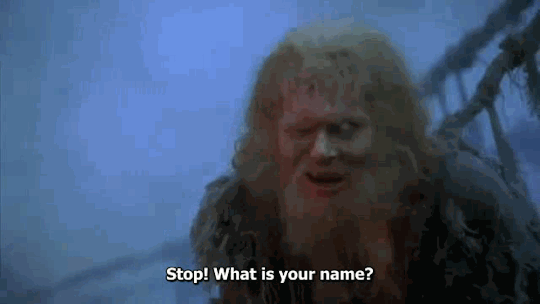
Add to that the fact that bridges are quite the war movie cliché, they are obvious landmarks to destroy, and vital targets to control. Destroying a bridge often means isolating and weakening the enemy, depriving it from communication and food, water, or medical supplies.
So, of course, we get to meet the bridge trope again and again in Star Wars. And, more often than not, the bridges we get are bridges of Death. From the Phantom Menace’s Duel of the Fates
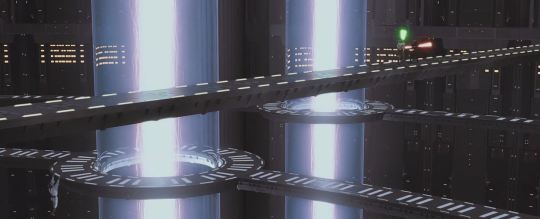
To Han’s death in The Force Awakens.
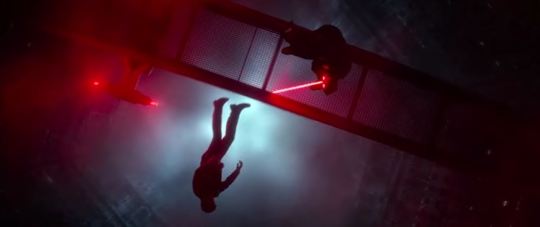
It is actually fitting to say that both scenes constitute an interesting framing for the Skywalker saga. Duel of the Fates is a very apt name for the beginning of the saga. Remember that Anakin’s name is etymologically “Ananke”, that is to say Fate, Destiny. Anakin’s fate is in the balance there, and the end result of who gets to become his Master and teaching him about the Force is key. Had Qui Gon lived, possibly, there would not have been any Vader. As for, Han’s death in TFA, the constant play of words between sun and son, and the not so subtle imagery of light and darkness, is supposedly all about Kylo’s fate. If Qui Gon’s death is possibly the first step towards the fate that will turn sweet lovable Anakin munchkin into big bad Vader, Han’s death is the counterpart of this scene, thus the first step towards big bad Kylo turning eventually into lovable Ben Solo. And just as it took three movies to realize the Fate of Anakin, it will take three movies to realize the Fate of Ben Solo. But I digress. Or not.
Because both stories, which interact like mirror images of each other, are perfectly hinged around two other crucial bridge scenes. One in ESB. And one in ROTJ. You know what I’m talking about, right?
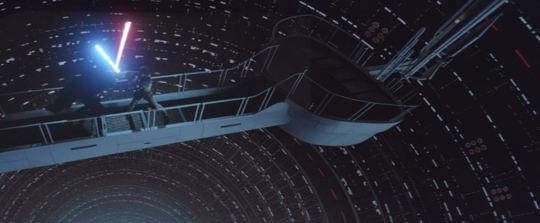
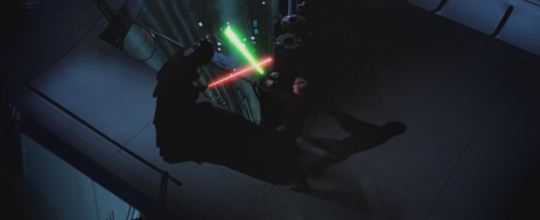
And these two are also counterparts. ESB’s bridge scene is Luke’s symbolic death scene: learning the truth about his father, and losing his hand, he would rather choose death and commit suicide. ROTJ’s bridge scene is Vader’s death and Anakin’s redemption, with Luke accepting the truth, Vader losing a hand, and choosing to save his son’s life. Even the placement of the actors emphasize this idea of mirror image. So Luke gets his Troll Bridge twice: he fails the test the first one, falling to the chasm and falling apart, and succeeds the second time around. Doing what? Throwing away his saber. Choosing love. Refusing to kill.
But I would also like to stress out that, from a certain point of view, Luke is not the only one who gets tested there on the Troll Bridge. Anakin, just like his son, also fails the first test and passes the second. In ESB, he has little to no love to offer and tempt Luke to his side: he offers the vague promises of the power of the dark side and ruling the galaxy together (which didn’t work with Padmé either). In effect, he is selfish, abusive, scarring his son physically and psychologically, and does not seem too distressed when Luke lets go and falls “presumably” to his death. In ROTJ, he chooses the losing side, standing against the Emperor to save his son’s life, which he knows, will eventually cost him his life. Thus, he is showing empathy and remorse, and saves Luke through a selfless act of love.
Yep, that is what the OT is about.
And, arguably, these two scenes constitute the very axis around which the other two trilogies are built. Hence my first “digression”.
It is also very interesting to note that in the four cases exemplified so far, the “bridges” in question are seemingly “reactor cores”, excuse my tech ignorance. These scenes are never about bridges out in the open, over a river, connecting two shores. They are always played out over a chasm, surrounded with energy fields, in dark environments with a possible fall into a bottomless abyss... Two possible interpretations:
because they are battle of the brains, moral battle of good versus evil within oneself. Inner battles. Think grey cells, cerebellum connections, as a map for these duels.
because they are battle of the heart. Issues of love. “core”
Honestly, I think they both go together!
Symbolically, they are your typical “choose the right path” bridges, the life and death, good vs evil bridges.
The many bridges of Luke
If you actually consider the OT, Luke’s journey is very much rhythmed by a series of bridges. Which might seem ironic for a boy coming from a desert planet with no water, and thus, no use or concept for bridges (besides rocky arch formation such as we see during the pod race in PM). But consider the last name GL decided to give him: SKYWALKER. That was not the orginial name he had chosen, right, since in first drafts Luke was called “Starkiller”. Consider then what a huge difference it makes when you move from a very martial moniker “Star/killer”, which is all about destroying life and light (and Luke actually comes from “light” etymologically speaking) to choose something that means: the one that walks the skies. Not flies. WALKS. And if you walk the skies, chances are you are walking on a bridge of some kind (like mythological rainbow bridges). Crossing a bridge is very much akin to walking the sky: you are suspended between heaven and earth. So even the name GL chose for his star family is all about “walking” on bridges.
The “bridge” moment in ANH is rather brief, but quite interesting. It is actually the “NO BRIDGE” moment, the one when Luke and the Princess find themselves locked out with no crossing, and stormtroopers shooting at them. This moment:
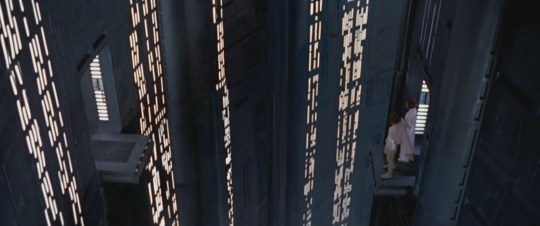
What does it reveal about Luke? His ingenuity, since he uses his farmboy utility belt to cross the bridge, but then also his instincts, the fact that he can rely on his roots (what he learned as a farmboy), his audacity, his ability to take a leap of faith (something that will play out later in his relationship with his father). But it also sets him apart as a different kind of hero. The NOT MY LUKE people should really pay attention to these details. Sure, he plays the hero, saves the damsel and everything, but in this scene they work together, she also gets to protect them, he trusts her with defending them, she is the one giving him a kiss for luck. This is very positive masculinity. Heroic, but not pushy. Manly, but respectful of women. Physical but also using his brain. Luke is such a dear.
In ESB, the big bridge moment is the one I already referred to. The moment of truth. Having these two characters on a bridge is very clever of course. It’s all about meeting in the middle. A bridge is by essence a balancing act. Can they meet halfway or will they cut all connections? Can opposites reconcile? Will they connect/reconnect? What better way to talk about human emotion and love than put them on a bridge, the very metaphor for communication, leap of faith, and the possible danger of reaching out to the other with your feelings?
But ROTJ goes even further with the bridge metaphor. Going with this when Luke reveals the truth to Leia...
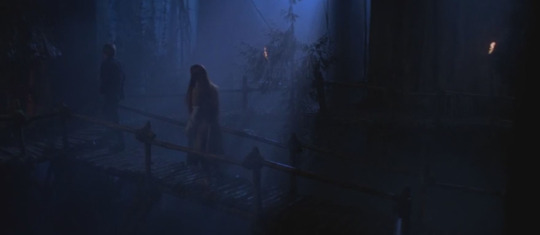
To carry on with Leia and Han, where Han shows more of his emotions ans proves how supportive and selfless he can be when he is just there to comfort her in the end, putting away his jealousy and self-doubts:
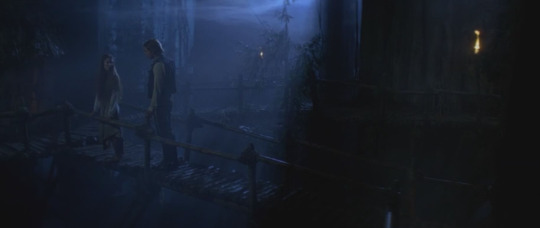
Followed with this, for Luke and Vader’s first meeting since ESB when Luke calls him “father” for the first time and tries to bring him back:
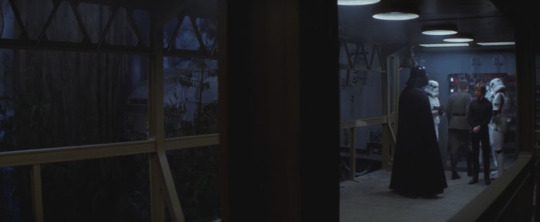
To conclude with the bridge sequence already mentioned when Vader chooses to be Anakin all over again.
WOW.
And where does it all take Luke? To a water planet with NO bridges. Seriously. When VII opens, Luke has chosen to sever, metaphorically speaking, all the links to others. As if he had chosen to destroy every bridge that could connect him to Leia and the rest of the world. And when we see him going about the island, there are no bridges. He jumps from one cliff to the other. Interesting thing is on The Art of The Last Jedi you get to see some of the art concepts that they had for Ahch-To that included a lot of variation on bridges:
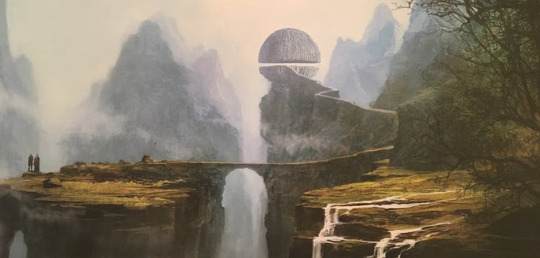
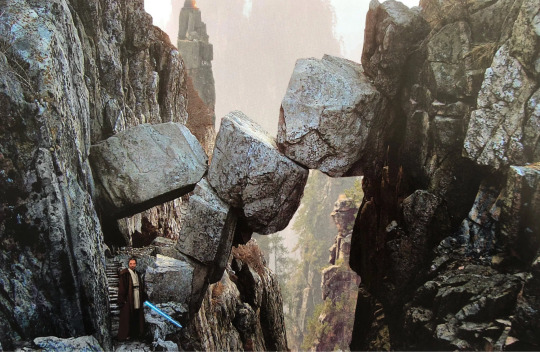
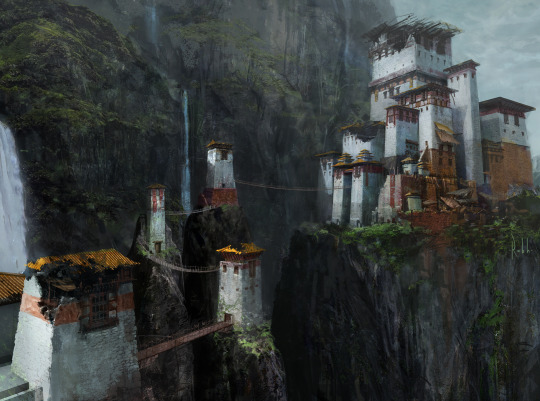
But eventually they went for the very design that removed any bridge from the place that Luke has chosen to spend the remaining days of his life until his death. Which is, I must say, a very good choice. He disconnected himself from the Force, he disconnected from people he loved not telling them where he hid, it made absolutely no sense to put him on a place that was covered with bridges. The bridges were meant to be burned.
That is... until one very last moment. Which is the perfect segway into my next chapter... Until the end. When he projects himself for one final face-off with his nephew. And that is a big bridge metaphor about reaching out across the stars. And we know that when Luke is on a bridge with someone he loves, this doesn’t mean harm or spite or revenge. Or even fighting. Bridges in SW are not so much about fancy duels as they are about love. Yep, even in PM. There is the love that Obi-Wan (yes, even a Jedi) feels for his master, and the need to extend and take care of a little boy that is all alone in this galaxy. A leap of faith. Love. Which means...
The ST is about crossing that bridge
Yes, there are bridges in the ST. And how Kylo and Rey are going to be able to cross over and meet each other. Let me explain. This happens at the end of VII:

Visually, it tells us that there seems to be no possible bridge between the two characters. Yet, the whole point is that they keep on looking towards each other. The bridge,aka the connection, is their eyes (mirrors of the soul yadiyada). And sure enough, comes VIII, and the bridge is there. WTF, will you say? What bridge are you raving about. Well... that one...
The Force bond.
And how do I presume calling this a bridge? Because...
It was I who bridged your minds
Interesting choice of words. But there it is. Put it as plainly and simply as you possibly can. The Force bond is a bridge, a spiritual bridge between Kylo and Rey. That’s quite something, right?
Which means that, there may be some physical crossing of some kind in IX. Now, I don’t want to be presumptuous and declare for sure, but it would seem like a logical concept. And on Vic Mahoney’s moodboard...on the left, some of the pictures seem very bridgelike...
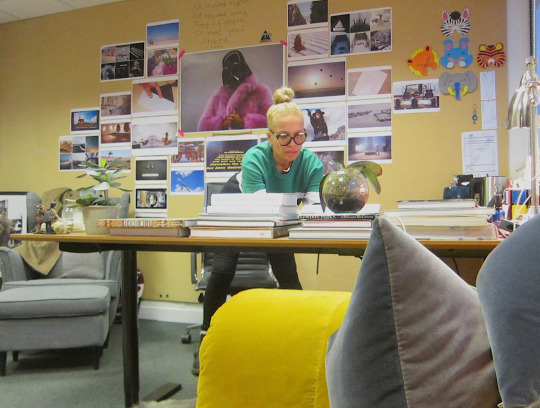
And that’s also where I want to bring in that clever little TV kid show called Star Wars Rebels.
Take it to the Bridge
So Star Wars Rebels came before the release of TFA, in 2014, merely two years after Disney bought LF and therefore all the rights to Star Wars. Let’s look at what they did there and let’s wonder why. I don’t think that it was a random move on their part. They could, after all, have imagined something that took place right before TFA, or come up with the many adventures of Luke and the gang, or even spend more time on the Clone Wars, or go way back in the Old Republic. But no 14 years after ROTS, 5 years before ANH, is the time they chose. And came up with a totally new gang we had never heard of. Except that... well... the new gang got to meet A LOT of familiar faces. From all over the place: Hondo, Rex, Ahsoka, Vader, Leia, Mon Mothma, Bail Organa, Obi-Wan, Darth Maul, Yoda, Lando, C3P0 and R2, Palpatine, just to name a few... The point is that they get to meet people from the PT AND people from the OT. Thus (you know where this is going) bridging story lines. And, surprise surprise, what special name did they choose for their hero? Ezra Bridger. Gosh, that’s not even subtle, there. And by the way, what does Ezra mean? Helper. So Ezra helps bridging... aka, Star Wars Rebels helps bridging, connecting, if you will storylines. Towards a logical conclusion. And what is this conclusion, pray? The ST of course. And who stands on the bridge? Kylo and Rey.
Even better, what particular storyline did they preciously choose to keep to conclude this new Star Wars story:
the return of the Mortis Arc, balance
the World between worlds, and its very specific bridges that cross through time and space, and the possibility to alter the past/future, plus bringing back loved ones
looking for knowledge (last time I checked it was not so much about knowledge in the PT and OT). But Ezra’s story is all about knowledge.
love and sacrifice, saving the people you love (Ahsoka, Kanan, Ezra), and, come on, Hera and Kanan’s baby (by the way, Kanan is very reminiscent of Canaan, the Promised Land, so keep the prophetic aspect in mind)
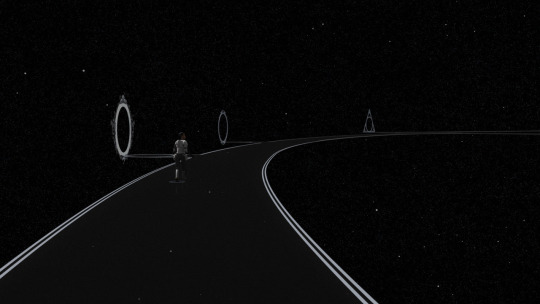
Again, how will it play out in IX? I have some ideas but I really can’t tell whether it will show up or not. There have been rumors about an artifact (very SW Rebels) that would require both Kylo and Rey’s powers. So knowledge. So possibly with notions of Mortis implied in there (balance). Love, sacrifice, we have discussed a lot. Remain the bridges. I can totally envision an important scene taking place on a bridge, with Kylo and Rey embracing, or running to each other, or holding hands while everything else around them crumbles. I can also imagine a bridge playing out with an intimate scene as we got in ROTJ in the Ewok village, something akin to the terrace where Anakin and Padmé first kiss on Naboo and finally get married. Again, the film has already been shot. So too late for that already and there’s a fat chance that it won’t even happen. But since we got a bridge of death in VII with Han’s death, we need a bridge of light.
Which might just turn out to be the symbolic bridge of Rey and Kylo coming together and finally uniting the light and the dark sides...
Leaving Simon and Garfunkel’s Bridge Over Troubled Water behind as a great Reylo vibe. Seriously. Reylo vibe, guys!!!!
When you're weary, feeling small
When tears are in your eyes, I'll dry them all
I'm on your side, oh, when times get rough
And friends just can't be found
Like a bridge over troubled water
I will lay me down
When you're down and out
When you're on the street
When evening falls so hard
I will comfort you
I'll take your part, oh, when darkness comes
And pain is all around
Like a bridge over troubled water
I will lay me down
#reylo fandom#reylo fam#reylo meta#star wars meta#star wars fandom#star wars parallels#star wars symbolism#star wars episode ix#bridges in star wars#reylo playlist
395 notes
·
View notes
Text
I HAVE SEEN THE WAR OF THE STARS
This was a very different Star Wars movie in the best ways possible. Whether you loved it or hated it, this movie would not have been possible without SW:TLJ, full stop. Personally, I liked this movie a lot. SW:ROTS is my favorite just because it’s a) the movie that got me to like Star Wars and b) Anakin, so nothing really compares to that for me but. I think I can largely attribute what I did like about this movie to how much it reminded me of story arcs in Clone Wars or Rebels (namely Mortis, Malachor, and the World Between Worlds), with the little caveats/side quests and side characters and the focus on arcane Force powers.
What I liked:
Kylo Ren and Rey being collective badasses on two opposite spectrums of the Force. You really get the sense that as things continue to become unbalanced, the more and more their powers grow. This movie is truly a love letter to fans of both Rey and Kylo Ren, because they both have largely satisfying developments (in their powers and their character growth). I’ve never hated Kylo Ren like a lot of people do. I like his character, I think he’s - at least - cool. This movie really showcased how formidable he was right off the bat-- from Title Scroll to opening scene. And if this movie showed how powerful he was, it REALLY doubled down on how strong Rey is. More on this throughout this ramble post.
Holy Sith lore, Batman.
Rey’s training sequence was everything Luke’s training sequence in SW:TESB should have been (limited ofc by film techniques of its time); I thoroughly enjoyed it. I know a lot of people are complaining about it, since she adamantly chose not to walk the path of a Jedi, but I liked that Leia got to be her Jedi Master.
Even though it was in the trailer, Rey flipping over the Kylo’s ship and slicing the wing off with her lightsaber was rad af.
Also followed by another rad af moment of her Force pulling the ship, like damn girl.
My face when Rey used Sith lightning was one of genuine shock like holy shit. This is also when I knew the “Force bloodline” twist ahead of time. It allowed me to become (mostly) okay with it. But damn, even Kylo Ren is like “...fuck”.
AUDIBLE SIGH OF RELIEF THAT CHEWIE DIDN’T DIE. Actual personification of that one bear vine.
Former spice-runner Poe is...sexy. What a concept.
Kijimi planet sequence was really cool. It also hammered home the entire space nazi motif in a very in-your-face way, which I appreciated because I feel like people try to rationalize the Empire and First Order as not being that, when that’s literally what they are. It also introduced Zorii Bliss, who I really enjoyed.
I really liked the style of the Force bond/Force Dyad moments in this movie. We got a good handful of them in TLJ and they were cool (and confirmed to not just be Snoke causing them with that movie’s end scene), but these were better. Just the way the scenes transition and the tangible objects being transferred between them.
Her parentage reveal, the mirror of the “join me” scene from TLJ [chef’s kiss] *
General Hux being the spy really reminded me of Alexsandr Kallus being Fulcrum in SW:Rebels, except Kallus was hotter and had less petty reasons for betraying the Empire.
The space horse...tusk...creatures. I love them.
Rey and Kylo Ren’s fight on the Death Star wreckage. Finally, at long last, we get to see some prequels level Jedi flips and jumps. FINALLY!
Leia’s last sacrifice c’:
Rey striking down Kylo Ren, healing him, telling him that she had wanted to take his hand when he offered, but she’d wanted to take Ben’s hand. So perfect.
Ben and Han’s mirrored scene from the bridge scene in TFA with Kylo and Han, line for line, with the right choice made this time. Just the combined effort of his father’s memory and his mother’s sacrifice having him throw his lightsaber into the ocean, killing Kylo Ren and becoming Ben Solo once more. So emotionally satisfying. **
Also: “Dad...” “I know.” very nice callback to TESB.
Force Ghost!Luke c’: catching that lightsaber as Rey goes to throw it into the flames; nice resolution to Luke’s arc from TLJ.
LUKE AND LEIA TRAINING SCENE FLASHBACK!!
Kylo Ren’s redemption/turn to the light was something that I thought I would hate, but I actually thought it was the one consistent character arc in the sequel films. I actually enjoyed it a lot, like everything about him turning to the light was handled well and you can track its path through the entire sequel trilogy. Don’t @ me.
Ben doing the classic Han Solo No Look Shot-- with Lando’s blaster (how did he get that?)
Ben absolutely butchering the Knights of Ren wearing the space equivalent of a sweater and jeans. Just the epitome of chaotic Skywalker/Solo energy. Iconic.
Enjoyed Ben’s little shrug of “finally” when Rey used their Force bond to transfer him one of the lightsabers to use. Was sitting there watching him fight like, get this man a lightsaber.
Also, regarding that moment, just the pause within their Force bond, actually, truly seeing each other.
All the voices of the Jedi. Chills. I heard Luke, Obi-Wan, Yoda, Windu, Kanan, Anakin. Ahsoka. ***
Rey’s sacrifice. Ben’s sacrifice. For a moment, I thought they were going to kill both of them and Palpatine (which I would have hated and appreciated at once; zero it out, bring balance to the Force via a flatline), or leave Rey dead and Ben alive to be haunted by his own deeds and demons. It was a surprise that Ben could use Force healing in the way Rey displayed earlier in the film, but a good one. Thanos vc: a soul for a soul.
“Ben” c’: such a bittersweet moment of acknowledgement and redemption tbh. ****
Rey burying Luke (Anakin’s) and Leia’s sabers on Tatooine c’: *****
Rey’s yellow lightsaber made from her staff. I wonder if it’s double-bladed (I bet it is).
I had a feeling one way or another that by the end of the movie Rey would be taking the Skywalker name for herself. I’m sure this made a lot of people angry. I’m not one of them.
What I didn’t like:
Not much tbh!
The Reylo kiss I guess, since it felt shoehorned in since they were both enemies 12 hours prior (if that). It would have felt more natural if it had just been a brief embrace or (as a friend suggested) a forehead touch. I’m totally okay with Rey and Ben having this strong connection through the Force, but no matter where you stand on the idea of those characters being romantically involved, you have to admit that they just weren’t there yet to have that kiss. ******
Conflicted that the Skywalker bloodline is gone. Like, trust me, I know the point - or one of the major ones - of this film is that blood doesn’t dictate choices/blood isn’t important, but like...I really love the Skywalkers, okay?
Palpatine being alive in this pretty much invalidates Anakin’s journey in the first six episodes, which sucks because in this house we love and appreciate Anakin Skywalker. You get a sense that Palpatine’s return was definitely never the end goal for this trilogy. It doesn’t feel planned because it’s never explained how he’s back, how he survived. We’re left to assume that it’s Sith power sustaining him. We never find out how Palpatine (who’s basically a zombie, I mean, look at him) managed to create a massive fleet of Star Destroyers capable of destroying planets. That’s just how it is, deal with it.
Asterisks/Questions Unanswered/Misc.:
* Still can’t believe Rey Palpatine fan theories DID THAT. Press F to pay respects to my Rey Kenobi theories (which would have made more sense with a Force bond but WHATEVER).
** This is where I would have wanted Anakin’s Force Ghost moment to be, especially since Kylo Ren idolized the ideal of Vader for so long, I felt it would have been a nice touch to have Anakin step in here, while across the galaxy Rey is being reached out to by Luke. Ultimately though, I think Han worked best.
*** Look, I know Ahsoka’s voice was in the past Jedi/Force Ghost moment, but like...my girl ain’t dead. Togruta live for over 200+ years, plus she was resurrected with the power of The Daughter. She just Force Skyped in to give Rey an inspirational line. Also Ahsoka is...not a Jedi, so ? interesting.
On that note, the above scene also reminds me 100% of Ezra’s moment in The World Between Worlds.
**** Really wish redemption didn’t always have to mean death, but I also understand that just like in ROTJ with Vader, there was a slim-to-none chance of a future for Ben after doing everything he’d done. But I also think death is...an easy out, when you don’t want to think about how a character can continue to atone for their deeds. I would have liked to see Ben live.
***** As for burying Luke and Leia’s sabers in the sands of Tatooine, Luke never associated himself with Anakin’s saber, so she buried Anakin’s saber in a place he hated and associated with so much pain and loss.
****** Reylo has never really been a ship I sailed, though I’ve never expressly hated it (there are certainly far more uncomfortable scenes with Anakin and Padma in AOTC than there have been between Rey and Kylo Ren in the sequel films), but if one of them is going to die, don’t have them kiss. If you’re going to have them kiss, let them live.
Finn never really did get to tell Rey what he wanted to tell her, huh? I joke. I think it’s obvious by the final act of the movie that he wanted to tell her that he could feel the Force, that he’s Force sensitive. This was hinted at in TFA during several beats (especially when he fights Kylo Ren-- anyone can use a lightsaber, but it’s kinda curious that he could hold his own for a bit).
This movie radiates a bi energy in ways I can’t describe. All the stuff with Poe being real concerned about what Finn wanted to tell Rey when he thought they were going to die? Poe and Zorii? Finn and Jannah? Poe and Rey? Really can’t believe they cut away before Finn and Poe kissed in the end celebration scene.
Ben Solo > Kylo Ren
#sw:tros#sw:tros spoilers#tros spoilers#star wars spoilers#episode ix spoilers#episode 9 spoilers#unless you're tagging it something weird that should about cover it for spoilers
10 notes
·
View notes
Photo

“Keep the main thing, the main thing. The rest is noise”
An essay by Morgan Adriano
- The past few months was never been easy for all of us. Tragedy upon tragedy, losses upon losses, news upon news, deaths upon deaths and so on and so forth. People losing jobs, people dying left and right, people complaining, people disobeying and to be frank with all of you, this has been the hardest for me as well. Being a fresh graduate and my first year entering the work force, everything seems so uncertain, unsure and to put it simply; shaky. In my Career? Training? Family? Friends? Goals? Future? A lot also happened after college which I am not ready disclose here and will not ever cause we not close dude hahaha.
- With the COVID19 situation, Social isolation how now become mainstream and we are left to ourselves and our own thoughts. As so we thought.... Eventually we are indulging ourselves with the internet or netflix , "working hard" or trying to keep ourselves busy. But had you really spent time with "yourself". I did all of these. With days past by, I was able continue to reflect upon how our society is being shaped by media and how we are consumed by it. From movies, music, advertisements and to social media, (Disclaimer: they are not inherently bad and I'm not saying social media and media in general is the devil and we are living in a black mirror episode and you must immediately and completely disconnect from the internet. A thought that actually got in my head for some instances haha. I enjoy art forms like music, movies and books so this exempts me from being a hypocrite HAHAHA) they all had some sort of impact of how we perceive life and how we navigate through it. Everyone and everything is battling for our attention, time and money. Telling us how to do this and that. That you must hustle and hustle, compete with others, wake up at 4am, this is what success looks like and etc. (Might be another topic that I will explore soon). Till the point we are blindingly consuming large of amounts of information till no end. This was my illness. I would actually waste hours on hours on time in the internet "learning" or a better term for this is "knowing" what I can and consuming what I can, telling my self the more I know the better employee, leader, coach, future-father, son, brother, friend and person I can be. And to a certain extent they actually helped. But I think, we all have lost the most fundamental skill that we as humans posses: The ability to think critically and clearly. We blindingly accept what the media, internet offers us as true without discerning about how that idea was formed or why was it formed? We don't second guess everything we take in. True or not. We eat it like fast food; having no regard for it's affect on us just as long it satisfy us and our deepest desires we have. We are becoming morbidly obese with information. And thinking that knowing the "stuff" would eventually allow us to attract all the goodies of life or also use the narrative that has been constantly displayed in media to our own lives (Case and point: Love stories and even sports films etc.) This saddens me that, I, and most people in society have fallen victim to it and it's dangerous and a life-sucking cycle.
-But just one step; that primordial step can help you to take control of your life: Self-Awareness. Awareness of one's surroundings and one's self. Once you become aware of the imperfections of society, of people and of yourself, you stop complaining, comparing and loathing. Because it gives you perspective and to gladly quote Obi-Wan Kenobi in Return of the Jedi: “Luke, you’re going to find that many of the truths we cling to depend greatly on our own point of view.”. We must eventually find it for ourselves: what do we value, what is our standards, what is our priorities and most importantly what do we define as success. Do you let “them” define all of these for you? Or do you define them for yourself? Is it that car? Is it that job? Is it that title? Is it that award/achievement? Is it that reputation? You choose. To go back again to my previous point. Do we think critically and clearly on what we consume? or do we allow it to consume us... Our point of view, our values, our standards, our priorities, our own perception of self. Even down to our clothing choices. - Although COVID-19 and it's influence on us is undeniably negative, there are still silver linings to enjoy in between these times of unrest, anxiety, depression and uncertainty. This pandemic can teach us to slow down (And I mean really slow down and not binging on "The Office US" which I downloaded illegally because Netflix had it taken down. So at least I'm being honest HAHAHAHA). Reflect, recollect and meditate. What really matters to me? Who is at the driver seat? What and whose narrative do I follow? What are the voices that I listen to? What are the voices **in my head** that I listen to?.......... What is the main thing?.. Which is the noise?
- Matthew 7:13
- Disclaimer: I myself is also navigating this journey called "life". So take this with a grain of salt. This is by no means a preaching piece but an observational piece. But if you do see it that way: Remember what Bruce Lee said: "Adapt what is useful, reject what is useless, and add what is specifically your own." This may have been a season in my life. This perspective may probably change or so but we (I) will see.
- If you have made it this far: May I congratulate you for your tremendous knack for focusing on one task and not multitasking like looking at or doing other things while reading and enjoying this piece. Thank you for taking time to read my thoughts and opinions. More power to you my friend!
I never thought writing would be great tool for coping with the times but this has been totally true for me who constantly overthinks and who recently learned that he is high in neuroticism. I am surely enjoying it and will probably write for the days, weeks, months and even years to come. (Journaling most likely) I'm doing this not to show off my quote on quote skills and my "pRoFouNdNeSs" but to share and put out my opinions and ideas and use this as means for the search of mental clarity, self awareness and not for attention and the likes. So all of you judgemental pr*cks out there can have a nice day :)
P.S. I got the first statement of the title of the piece from my mentor. So credits to him.
1 note
·
View note
Text
One of the exercises in Julia Cameron’s The Vein of Gold is to compile a list of favorite movies--or ones with images that resonate with you--and note any patterns that arise. Here are some of mine, with observations below.
(For the purposes of this exercise, I’m sticking with live-action films, but there’s no reason why there couldn’t be animated films.)
1. Star Wars Original Trilogy (Star Wars, The Empire Strikes Back, Return of the Jedi)
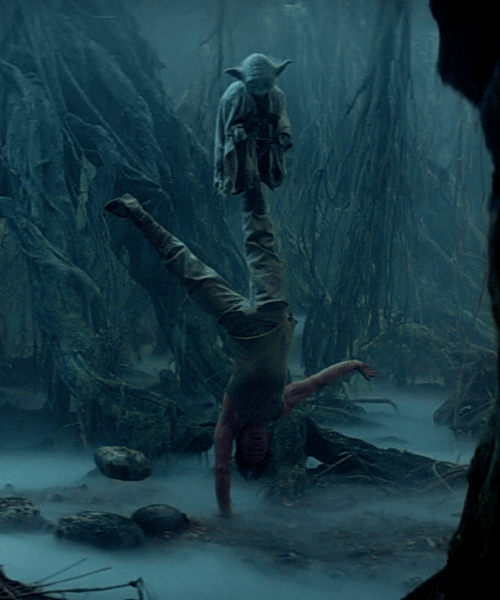
(Yes, I know this is technically three films, with three different directors and independent histories, but I didn’t feel like listing them all separately.)
2. The Lord of the Rings: The Fellowship of the Ring
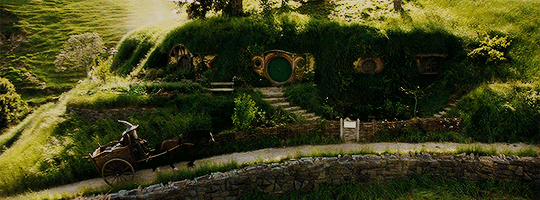
Ironically, I love the first Peter Jackson movie, but not any of the subsequent ones. Which is not to say they’re necessarily bad movies, but they’re not the ones I’d want on endless loop. (Part of this is because The Two Towers and The Return of the King are essentially war movies, and also because I have to watch Faramir act OOC, which hurts my soul.)
3. The Secret Garden
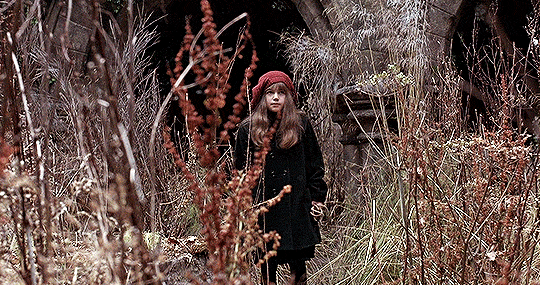
4. The Matrix
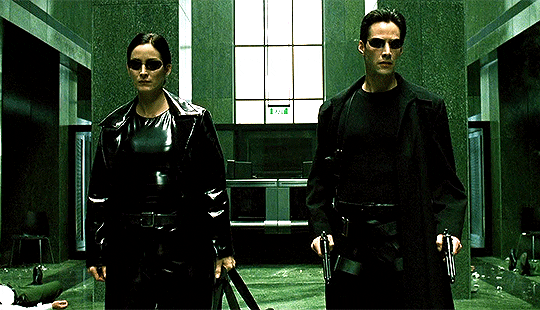
I actually don’t have strong feelings about Reloaded and Revolutions--like, the actual plot is weird, but I am so not watching these films for plot.
5. Return to Oz
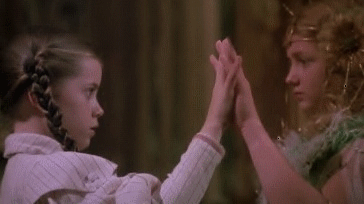
6. Inception
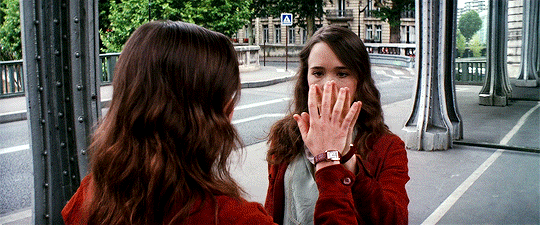
7. Labyrinth
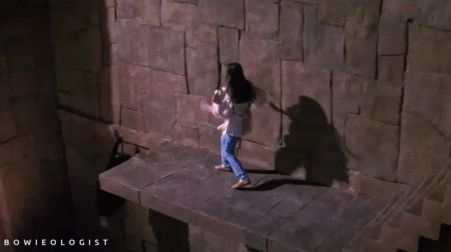
8. The Terminator
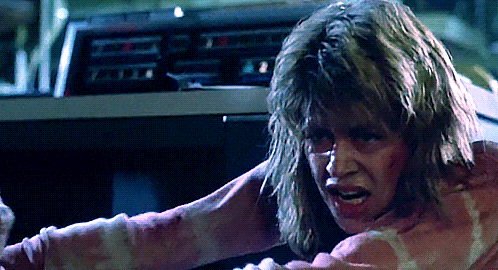
Don’t get me wrong, Terminator 2 has a lot going for it, but it’s not the one that I can’t stop thinking about (except for that one deleted scene with Michael Biehn, which is a totally different story).
Thoughts and Themes:
So at first glance, it seems like I have two separate categories: ‘80s and ‘90s-’00s films. Or maybe it’s sci-fi and fantasy? The Secret Garden is the only one that even approaches some kind of realism, and even that is a pastoral kind of world that would not be out of place in the more peaceful parts of, say, Middle-Earth (especially Fourth Age). How about high-tech vs. low-tech, or cyberpunk vs. fairy tale? Or, even better, what about reality vs. illusion (or story vs. truth if you prefer)--which is also a major tension within every film on this list?
I’ll also note that most of these films have an epic color palette, with memorable landscapes that either serve as characters in and of themselves, or symbolize the mental states of various characters. These films are beautiful works of art, reveling in The Aesthetic, whether that’s the idyllic peacefulness of the Shire or the grimy back alleys of 1980s Los Angeles.
The thing that really got me when I laid it out like this--the thing I hadn’t noticed before--was that all of these involve a (sometimes literal) rebirth, transition, or journey from darkness to light (or light to darkness to light again, depending on the work). You could also substitute life and death here, and not change much.
This is, again, often quite literal: Sarah moves underground in Labyrinth, the Fellowship descends into the Mines of Moria, the secret garden comes to life with the spring, Dorothy confronts the Nome King in his underground lair. Neo wakes up to find himself naked and soaked to the skin, and flushed down the tubes like garbage, in a literal hellscape where the machines destroyed the sun (a motif that also appears in Terminator’s dystopian future), then literally dies and is resurrected at the end of the film. Luke goes underground to confront his own double--another recurring theme!--on Dagobah.
Duality and the exploration of one’s soul through another world is HUGE big theme--or, to put it another way, The internal mirrors the external. This is a huge motif of Inception, which is a literal inward journey into a character’s psyche; and you could also make the argument that both Return to Oz and Labyrinth cover similar territory. Is Oz real, or is it in Dorothy’s head? Is Ozma a part of her, or is Ozma a separate entity? Is Jareth a real foe or is he the embodiment of Sarah’s fears and desires, a fantasy she concocts based on a story in a book? And Frodo realizes he’s not so different from Gollum, that the sad shriveled creature is what he could become if he fails at his task--and, ironically, his kindness to Gollum is what allows the quest to succeed when Frodo finally succumbs to temptation.
Frodo in the The Fellowship of the Ring sees the world differently when he wears the One Ring, and it’s terrifying. Sarah Connor realizes that she’s left her ordinary world behind and crossed into Kyle and the Terminator’s reality in a moving speech, and The Matrix doesn’t even try to be subtle. Even The Secret Garden uses the eponymous garden as a metaphor for the blossoming of Mary’s own soul, and the souls of those around her (especially her uncle and cousin, but also Ben Weatherstaff).
These stories are also concerned with ecology, though it’s usually a background motif, since the main focus is on saving the world (or what’s left of it, i.e, humans). The Shire is paradise; Mordor is a desolate hellscape, dominated by a giant volcano. Kyle Reese breaks down over the beauty of the world, and Mary Lennox seeks to bring the lost garden back to life. Dorothy retreats elsewhere after the grey grimness of Kansas/the mental hospital.
There’s also a real tension concerning humans’ relationship to technology in these films. The Matrix is an illusion, and machines control the earth. Or the machines don’t even bother farming humans and aim to kill ‘em all. Saruman literally transforms Isengard from a tree-lined field to an industrial hellscape. The mental institution uses that freaky electrical machine on Dorothy. Star Wars is more accepting of droids and technology, but even there, there’s tension: Obi-wan calls Darth Vader “more machine than man,” and it’s not a compliment; the Death Star is built to obliterate entire planets and must be stopped twice.
I’d argue this theme goes deeper than human/tech--it’s really human/other, with technology providing one kind of other. There’s human-alien interactions in Star Wars and Labyrinth, not to mention Mary’s relationship with the robin in The Secret Garden, Dorothy’s friendship with Jack Pumpkinhead and the Gump. On a less friendly note, Frodo’s relationship with Gollum is the emotional crux of the Lord of the Rings.
These films also feature the classic hero’s journey, but often through a female lens. The protagonist usually has no special skills other than their strong moral character and determination--or even if they do have skills (like Ariadne*), they still serve as an audience surrogate or substitute, a stranger to the new worlds they visit. The protagonist has at least one faithful friend/companion/love interest to help them (sometimes even a team/found family), and often a mentor as well (who may or may not be a crusty eccentric). In the end, the characters must take control of their own destiny--Frodo chooses to leave the Fellowship, Luke throws away his lightsaber rather than kill his father, Sarah declares to Jareth “You have no power over me”. Sarah Connor yells, “On your feet, soldier!” and keeps going to the bitter end, and Mary Lennox is unafraid of her bratty cousin’s wrath and puts a stop to it when everyone else enables him.
*(As an aside, I know Ariadne’s not the main character in Inception, but I find the actual main character way less interesting, so she’s the one I focus on, just like I find Trinity far more compelling than Neo.)
Characters often have Meaningful Names: Morpheus, Trinity, Neo; Ariadne; Luke Skywalker, Han Solo. These films also feature a question of fate and inevitability - Luke has precognitive visions, Neo consults the Oracle, Sarah is told “there is no fate but what we make for ourselves,” with Kyle serving as an oracle of sorts with messages from the future to come. The Mirror of Galadriel shows possible futures for the Shire, too.
Another theme is that the protagonist must suffer and/or work hard for their transformation. Mary has to do the actual work of gardening; Luke has to sweat and do handstands (beautifully, I might add); Frodo has to walk to Mount Doom; Sarah has to walk the labyrinth, and Sarah Connor has to survive a fucking nightmare. Dorothy has to rescue the royal family of Ev and free Ozma; Ariadne has to design a dream-puzzle for the heist to work. Even Neo has to train with Morpheus--though he’s able to use cheat codes to download martial arts directly into his brain without having to sweat for it; his real journey is in self-confidence.
In keeping with the stunning visuals, impossible feats are regularly featured, and excellent, cutting-edge-for-their-time special effects are prominent. Many also feature stunning fight scenes--the classic Luke vs. Vader duel on Cloud City; the “I know Kung fu” sequence in The Matrix; the clashes in The Fellowship of the Ring. Jareth has some excellent moves in Labyrinth, too, although he’s more inclined to dance than traditional battles.
I couldn’t resist contrasting my favorite moment in Return to Oz--rescuing Ozma from the mirror prison--with Ariadne shattering her own reflection in Inception, because that is such a moment for me, encapsulating all of the reality/illusion, internal/external, self/other dichotomies I mentioned above. (See also the Mirror of Galadriel above.) Inception and Labyrinth also share the motif of impossible Escher staircases, which I freakin’ adore.
It will probably come as no surprise to note that I also enjoyed films like The Dark Crystal, The Neverending Story, and What Dreams May Come, which tap into similar themes and imagery. You’ll probably be able to guess that The Sword in the Stone is my favorite animated Disney film, too.
I also love a number of Asian films like Hero, House of Flying Daggers, and Crouching Tiger, Hidden Dragon, all of which feature beautiful landscapes and color palettes, stunning fight scenes and special effects, along with a healthy dose of the fantastic, and a focus on story vs. reality (often with a plot twist or surprise reveal at the end). This is unsurprising when you consider the strong debt both Star Wars and The Matrix owe to Asian cinema in terms of style, plot, and aesthetic. In those films, the tension is more society vs. self, but duality is still very strongly present.
If you notice any other patterns or recurring themes, let me know; I’d love to hear them! Also, if you can think of any other movies I might enjoy based on this, let me know.
4 notes
·
View notes